










The latest snapshot of medical training in Australia has revealed ophthalmology ranks highly in terms of trainees recommending their position to other doctors, but bullying, harassment, discrimination and long work hours remain a concern for the profession.
The 2020 Medical Training Survey (MTS) is the Medical Board of Australia’s second ever nationwide survey of all doctors in training and is a confidential way to get national, comparative, profession-wide data to strengthen training.
Almost 22,000 trainees participated in the 2020 survey at a 57% response rate, more than double the inaugural 2019 figure. Seventy-four trainee ophthalmologists responded,
providing a more accurate picture than 2019 when just 26 took part.
While overall training satisfaction was high, the survey found almost one in four RANZCO trainees (24%) experienced bullying, harassment and/or discrimination in the workplace, compared with a national average of 21%. In total, 77% agreed they knew how to raise these concerns, including racism, in their workplace, while 70% believed they could access support from their workplace after experiencing a traumatic event.
RANZCO censor-in-chief Dr Justin Mora, previously chair of the college's Advanced Clinical Examination Committee, told Insight bullying, harassment and/or discrimination was “a significant area

of concern”, and an issue the college took seriously. He said trainees were covered by employers' bullying, harassment and discrimination policy and RANZCO requires training posts to have an appropriate policy before they are accredited.
“The accreditation process also has stringent and confidential processes for trainees to report any issues that they experience
or witness,” he said. “At each accreditation review we are asking training posts to report the outcome of any bullying complaints. We hope this ensures the staff at each training post are aware of their policies and are supported to enact them. Training posts are not provided reaccreditation until all issues are satisfactorily addressed.”
RANZCO would also like to see the number of average weekly hours worked decrease among its trainees. On average, RANZCO trainees worked 49.7 hours a week, 4.1 hours more than the national average of 45.6 hours. Also, 83% of ophthalmology trainees are working 40 hours a week or more, compared
A clinical trial backed by pharmaceutical giant Johnson & Johnson (J&J) is under way in Australia for a novel eye drop treatment for retinal vascular diseases that could replace serial anti-VEGF injections.
The radical advancement that could see eye drops become a main treatment for diabetic macular oedema and neovascular age-related macular degeneration (nAMD) stems from initial work carried out at the UNSW School of Chemistry by Professor Jonathan Morris. Over the years, Morris has collaborated with the University of Nottingham’s Professor David Bates, leading to the formation of the company Exonate to develop a
molecule delivered via an eye drop.
Their work resulted in the molecule EXN407, which demonstrated the best permeability compared with previous compounds they’d developed, meaning it was present at therapeutic levels in the retina. It also had excellent potency, while the solubility and stability were significantly improved.
Until now, drug developers have failed to create VEGF inhibitors that could be delivered to the back of the eye in high enough concentrations, without intravitreal injections.
“It has never really been done so we faced a lot of pushback when looking to receive funding,” Morris, who was also Exonate’s head of medicinal chemistry, said.
“The eye is complicated with many different membranes, all of which work to protect the eye from external factors. The other challenge is that no one really knows what chemical properties are important for permeability, especially to the back of the eye.”
Morris said EXN407 affects VEGF but, importantly, isn’t an antiVEGF therapy. UNSW researchers identified novel compounds that modulate the growth factor causing retinal vascular diseases. The protein that controls which type of VEGF is produced is the enzyme SRPK1, which EXN407 works to inhibit.
“Inhibition of SRPK1 with our small molecule inhibitors results in

COVID-19 has set optometric trends on an even steeper trajectory. HILKE FITZSIMONS explains why Zeiss Vision Care’s future-focused products are wellpositioned to support optometry during its next evolution.

60% slow down of myopia progression*
*Myopia progression (SER) by 59% and axial elongation (AL) decreased by 60% compared with those wearing SV lenses.

Have lockdowns harmed efforts to rein in Australia’s worsening myopia problem?

Latanoprost was a breakthrough for glaucoma in the 1990s and remains a go-to therapy today.
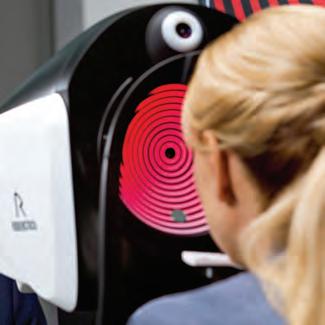
Independent optometrists discuss how a new instrument is raising their lens sales by a third.
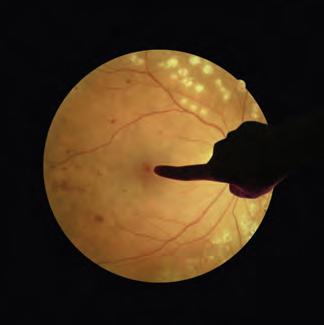
An examination of the once-in-a-generation program two years since its launch.

Recently I sat down with my fiancé to watch the new Open Your Eyes documentary by US optometrist Dr Kerry Gelb. For someone with rudimentary exposure to eyecare, it was fascinating to watch her realise the central role eyecare professionals are playing in people’s overall health.
The main message from Gelb’s film is the optometrist is the new GP, with almost 300 diseases manifesting in the eye and unrivalled access to blood vessels in the retina showing warning signs about systemic diseases such as hypertension or diabetes.
Society’s addiction to foods with sugar and refined grains – spurred on by poor government leadership – and its association with chronic illnesses was an enlightening part of the doco, and made me question much of what I’d been told.
Despite eating what was a technically healthy diet, according to traditional nutritional advice, Gelb takes a scan of his retina to find microaneurysms leading to concerns about insulin resistance. He speaks with several experts who point out he’s not alone. They attribute this to the somewhat misguided war since the 1970s against cholesterol and fats – including the once vilified egg and avocado –contributing to the rise of refined carbohydrates and industrial seed oils that make up the “lethal disease vector” that is the Western diet.
After overhauling his diet, Gelb’s microaneurysms reduced along with his heightened health risk, reminding viewers food should be our frontline medicine. Locally, it made me realise how urgently we should be heeding the warnings of ophthalmologist Dr James Muecke, and wonder what else our government could be doing, particularly with the flawed food health star rating system (see page 12).
While there’s plenty for practitioners to glean from Gelb’s film, its true power lies in teaching the public about the broad role of eyecare professionals and importance of preventative medicine in a very compelling manner.
MYLES HUME Editor

§,1-4,
Expanding the Clareon® AutonoMe® familyIntroducing Clareon® AutonoMe® Toric



Clareon® Toric IOL with AutonoMe® is the first and only automated, disposable, preloaded delivery system. With its intuitive, ergonomic design, the AutonoMe® delivery system enables easy, single-handed control of IOL advancement and protects incisions as small as 2.2 mm.1,5-6 Preloaded with the Clareon® Toric IOL, the world’s most advanced optic§,delivering excellent clarity.§,1-4,7,8
Available in dioptre range +15.0D to +25.0D (1/2 Dioptre steps T2-T6).1

Just as Insight went to print, AUSTRALIAN RESEARCHERS have helped to identify 44 new gene loci and confirmed 83 previously reported loci linked to glaucoma. “These new findings come out of the highestpowered genome-wide association study of glaucoma to date, and show the power of team science and using big data to answer questions when research groups around the world join forces,” co-senior study author Dr Janey Wiggs, of Mass Eye and Ear and the Harvard Medical School, said. “The number
of genes identified will lead to the discovery of new biological pathways that can lead to glaucoma, and in turn, new targets for therapeutics.” The international consortium involved QIMR Berghofer Medical Research Institute, CERA, Melbourne University, Westmead Institute for Medical Research, Lions Eye Institute, Flinders University, Adelaide University, plus more. IN OTHER NEWS, Flinders University and the Queensland Eye Institute have formed a new partnership to create a world-first international registry for lymphoma in the eye. With it not being possible to run clinical trials to identify best treatments – as lymphoma of the eye is rare – the alternative approach to
collecting medical information and improving treatments is a registry, which also provides information about medical practice in the real world. FINALLY, a new Lancet Global Health report found preventable sight loss cost the global economy AU$530 billion last year due to lost employment. It also revealed that while 1.1 billion people live with blindness or impairment, more than 90% can be prevented or treated with existing cost-effective interventions. The report also highlighted gender and socioeconomic disadvantage. For every 100 men living with blindness worldwide, there are 108 women affected. Much of this imbalance is due to socioeconomic factors.
n WEIRD
University of Queensland researchers have found a species of fish on the Great Barrier Reef with eyes that are incredibly well adapted to seeing in low light, a mystery because they live so close to the surface. Deep ocean fish have multibank retinas, where rod cells are stacked in between two and six layers. But these fish can have up to 17 layers.
n WONDERFUL
Tennis Australia launched an online audio stream to make Australian Open broadcasts more accessible to blind and low vision people. The technology turns spatial data from real-time ball monitoring into 3D sound, emphasises ball speed and trajectory, proximity to line and shot type. It also augments critical moments to allow audiences to follow the game without seeing the ball.
n WACKY
Researchers at UC Santa Barbara are developing a bionic eye that provides cues to the visually impaired, basing it off computer vision system technology in self-driving cars. “We are inspired by the computer vision literature, and are looking for ways to adapt these stateof-the-art algorithms for the purpose of providing meaningful artificial vision,” lead researcher Dr Michael Beyeler said.

The prevalence of myopia appeared to be three times higher in 2020 than in 2015 to 2019 for children aged six in China. Did the same happen in Australia? Full report page 22. Published by:
20-22
The National Aboriginal and Torres Strait Islander Eye Health Conference will include speakers who were to present at the ‘Close the Gap for Vision National Conference 2020’. guy.gillor@unimelb.edu
MAY 7-8
The 2021 WA Branch meeting on Rottnest Island will feature speakers Profs Nitin Verma, Mark Gillies and Ian Constable, among others. ranzcowa.com.au
11-15 Buckhurst Street
South Melbourne VIC 3205
T: 03 9690 8766
www.primecreativemedia.com.au
Publisher Christine Clancy christine.clancy@primecreative.com.au
Editor Myles Hume myles.hume@primecreative.com.au
Journalist
Rhiannon Bowman
rhiannon.bowman@primecreative.com.au
Business Development Manager
Alex Mackelden
alex.mackelden@primecreative.com.au
Client Success Manager
Justine Nardone
justine.nardone@primecreative.com.au
Design Production Manager
Michelle Weston
michelle.weston@primecreative.com.au
Art Director
Blake Storey
Graphic Design
Jo De Bono
Subscriptions T: 03 9690 8766
subscriptions@primecreative.com.au
The Publisher reserves the right to alter or omit any article or advertisement submitted and requires indemnity from the advertisers and contributors against damages or liabilities that arise from material published. © Copyright – No part of this publication be reproduced, stored in a retrieval system or transmitted in any means electronic, mechanical, photocopying, recording or otherwise without the permission of the publisher.
continued from page 3
with 66% of all trainee doctors in Australia.
When working unrostered overtime, 68% of RANZCO trainees got paid at least most of the time, markedly higher than the 50% national average. But 23% valued the extra training opportunities this provided.
Mora said RANZCO trainees were employed by hospitals or health services, which are generally covered by state health employment awards, meaning the college did not have direct control over trainees’ employment arrangements.
However, he said RANZCO had begun asking questions about trainees’ employment conditions during accreditation inspections.
“And appropriate remedial action will be taken if a trainee is found to be working unreasonably excessive hours to what is outlined in their position description and award,” he said. “As a result, we expect that the number of working hours for ophthalmology trainees will trend downwards towards the national average in future surveys.”
In other findings, ophthalmology trainees rated their training highly in 2020, despite major disruption due to COVID-19.
In total, 92% agreed they would recommend their training position to other doctors, which rated higher than the national average of 81%. Also, 85% of RANZCO trainees said they would
recommend their workplace as a place to train, compared with 81% nationally.
Mora said the pandemic made 2020 a difficult year for RANZCO trainees, with training suspended for part of the year. All exams were deferred to the end of the year and face-to-face examinations were conducted virtually.
“It is encouraging that the key performance indicators in the MTS were rated positively by trainees despite the difficult year they had to experience,” he said. "We believe the results are testament to the work undertaken by RANZCO Fellows, Committees and staff to support trainees during the disruption of training, subsequent transition to restart of training and the additional support provided to trainees once training recommenced.”
Other favourable responses included the quality of ophthalmology orientation (75% rated it excellent/good), quality of clinical supervision (88%) and quality of teaching sessions (94%).
In terms of assessments, 84% of RANZCO trainees felt exams always reflected the college training curriculum –considerably higher than 58% nationally – while 90% felt exam information the college provided was always accurate and appropriate (65% national average). However, just 27% surveyed said they received useful feedback about their exam performance (38% nationally).
Mora said RANZCO has started conducting an internal survey from 2020

"APPROPRIATE REMEDIAL ACTION WILL BE TAKEN IF A TRAINEE IS FOUND TO BE WORKING UNREASONABLY EXCESSIVE HOURS"
and was pleased MTS 2020 corroborated its initial findings.
“RANZCO is using MTS to evaluate how we compare against other Medical Colleges in the key performance indicators. In combination with our own survey and other internal feedback mechanisms, to help determine the key areas that we need to be focusing on so that the trainees have a great experience during their training whilst ensuring that we continue to provide high quality ophthalmic training and maintain our leadership role in ophthalmology in the Asia Pacific region,” he said.
Australian Medical Association president Dr Omar Khorshid was pleased the majority of medical trainees rated their training experience highly in 2020.
“But the results show we have more work to do to address long standing issues –unpaid overtime, excessive hours … and, most importantly, stamping out bullying and harassment, which is still a big issue in medicine and health,” he said.
“It’s time for state and territory health departments to get serious about valuing the time doctors in training spend learning and providing excellent patient care by reviewing and providing appropriate staffing and better rostering practices. It’s also time for employers to improve their workplace culture. They have a legal responsibility to provide a safe workplace for all employees.” n
continued from page 3
a reduction of VEGF-Axxxa isoforms such as VEGF-A165a, which are commonly high in nAMD, and increases VEGF-Axxxb isoforms such as VEGF-A165b, which leads to a reduction in vessel growth in the back of the eye, and ultimately, the prevention of vision loss,” Morris said.
“VEGF-Axxxb isoforms have also been shown to protect cells in the retina from the damage and death commonly seen in nAMD which can lead to geographic atrophy and promotion of angiogenesis, suggesting that our compounds may have an additional mechanism of action
over currently available therapies.”
In the trial, Exonate is collaborating with Janssen Pharmaceuticals, a J&J subsidiary. The double-blind, randomised trial is being conducted at centres across Australia, inclusing UNSW SOVS, in 48 diabetic patients with macular oedema. It consists of a dose escalation phase during which three doses of EXN407 and a placebo are tested, followed by an expansion phase with a larger cohort and a longer drug dosing period. The study aims to demonstrate safety and tolerability and an exploratory end point of efficacy through reduction in retinal thickness in a proportion of patients.

“Success in delivering a small molecule to the back of the eye by an eye drop would be a major accomplishment as it has been previously stated that injection to the back of the eye was the only viable mechanism for drug delivery,” Morris said.
“And given the protective effects of VEGFA165b it may well lead to a better clinical outcome than the current treatment.”
Morris said Exonate’s partnering with J&J was “very significant”, with the latter bringing funding, expertise and scientific support.
“Their partnering also provides validation of the hard work the Exonate team have carried out,” he added. n
Nova Eye Medical has announced its application to secure public funding for its iTrack ab-interno canaloplasty as a standalone minimally invasive glaucoma surgery (MIGS) procedure in Australia has formally progressing to the third and final stage of the assessment process.
The Adelaide medical technology company that has operations in Fremont, California, is asking the Medicare Services Advisory Committee (MSAC) to change item number 42504 to include its iTrack microcatheter technology, and has support from the Australian and New Zealand Glaucoma Society (ANZGS), Glaucoma Australia and The Australian Society of Ophthalmologists (ASO).
Introduced in May last year, item 42504 only mentions trabecular micro-bypass stent surgery in its wording, which Nova Eye says has the unintended consequence of excluding its technology.
iTrack received Therapeutic Goods Administration (TGA) approval in June 2015 and is approved for use in five major teaching hospitals in New South Wales, Western Australia and Victoria.
The company stated it was confident the unique mechanism of the iTrack procedure – which acts to restore the function of the eye’s drainage system rather than to bypass it or change it – combined with its excellent safety profile, will make a significant, positive impact on the glaucoma treatment landscape in Australia.
“The majority of MIGS procedures, including trabecular micro-bypass stent surgery, are focal in their approach. That is, they attempt to remove or bypass a particular point of blockage. In contrast, ab-interno canaloplasty aims to remove all points of blockage in the conventional outflow system – and does so without damaging or removing tissue, and without the use of a permanent implant,” Mr Tom Spurling, Nova Eye Medical director, said.
“iTrack is routinely deployed via an ab-interno approach across the USA and Europe in the treatment of mild-moderate glaucoma, and there is a growing body of clinical evidence attesting to its clinical efficacy and safety profile, both as a standalone MIGS procedure and in combination with cataract surgery.”
He added: “Surgeons in the USA have readily adopted the procedure. This is due, in part, to the fact that it is medically

reimbursed with a Category 1 CPT (Current Procedural Terminology) Code.”
The company stated that another reason behind the increased adoption in the US and Europe is the tissue-sparing, implant-free approach of the procedure, which preserves both the conjunctiva and the angle for future treatments. It has also been shown to preserve the corneal endothelium.
Further, Interim prospective data to be presented at the 2021 meeting of the American Society of Cataract and Refractive Surgeons meeting by US surgeons Dr David Lubeck and Dr Robert Noecker has demonstrated minimal endothelial cell loss following iTrack ab-interno canaloplasty (performed in conjunction with cataract surgery), with mean endothelial cell loss recorded at -4.8% at 12 months. This follows the presentation of data at ANZGS 2020 (-3% at 6 months), ASCRS 2020 (-3.1% at 6 months), ICGS 2020 (-3.1% at 6 months) and ESCRS 2020 (-5% at 12 months). The pivotal FDA trials for iStent inject (Glaukos) and Hydrus (Ivantis) reported mean endothelial cell loss at 24 months of -13.1% (cataract surgery-only control group = 12.3%) and -14.0% (cataract surgery-only control group = 10.0%), respectively.*
The final assessment of the company’s application is being completed by a contracted health technology assessment agency, assigned by the MSAC secretariat and will be considered by the Evaluation Sub-Committee (ESC) in the second half of 2021. At this point point a decision will be made regarding whether to include iTrack in item 42504.
* References can be found in the online version of the article at www.insightnews. com.au n
Alcon has reported its latest financial for the fourth quarter of 2020, which totalled $1.9 billion (AU$2.4 b), an increase of 2% compared to the same period in 2019. For the 12 months to December 31, worldwide sales were $6.8 billion (AU$8.5 b), a decrease of 8%, largely due to the pandemic. Q4 surgical net sales of $1.1 billion (AU$1.4 b), which include implantables, consumables and equipment/ other, increased 2% compared to Q4 2019, primarily due to strong adoption of PanOptix, launch of the Vivity IOL and demand for surgical diagnostics and phaco equipment and accessories. This was partially offset by reduced demand in monofocal IOLs and consumables. The company’s Q4 vision care growth of 3% was driven by contact lenses, with Precision1 reportedly gaining momentum.
The University of Missouri reached a confidential settlement with a former top pharmacy professor who it accused of stealing and selling student research that led to a dry eye therapy. Terms of the settlement with the professor were not disclosed, but the university alleged in a lawsuit filed in 2019 that its staffer improperly received $1.5 million after he sold the research without permission, with the potential of receiving millions more in royalties. The research led to a dry eye treatment, with the university contending the research and patents belonged to the school, not to the professor or the student.
Guide Dogs Australia has rebranded to better communicate the breadth of services it provides to people with low vision or blindness. Effective immediately, the rebrand – including a single, new logo, brand guidelines and redesigned website – aims to reflect how Guide Dogs services have changed over the charity’s 60-year history, extending beyond the brand’s iconic namesake. “Every brand tells a story. Ours is much-loved, but it needs some new chapters to better highlight how we support people with low vision or blindness,” Ms Charlie Spendlove, of Guide Dogs VIC NSW/ACT, said. "Our beloved Guide Dogs will always be vital to our story, but now they’re part of a bigger picture. Our new brand is modern, dynamic and impactful, and builds on the strength of our history and of all our offerings." 'Find your way' is now the new overarching strategic idea.

Australia’s peak body for the eye health and vision sector has called on the Federal Government to spend $67 million over the next 12 months to deliver 66,000 more public cataract surgeries and tackle extended wait times.
The proposal is one of the main pillars in Vision 2020 Australia’s recent submission to the 2021-22 Federal Budget that also recommends the development of more sustainable service models for cataract surgery ($1.2 million in 2021-22) and national protocols to improve access to surgery for Aboriginal and Torres Strait Islander People ($9.6 million in 2021-22).
According to Vision 2020 Australia, which represents around 50 member organisations, in 2019-20 an estimated 74,150 additional public cataract surgeries were required to clear backlogs for public cataract surgery, including some 8,500 surgeries for Aboriginal and Torres Strait Islander people.
With the Australian population ageing, the organisation expects the prevalence of cataracts will grow significantly unless action is taken now to clear public backlogs and support more sustainable models of public delivery.
As part of its cataract surgery plan, the organisation proposes delivering more than 66,000 additional cataract surgeries to help clear the backlog at a cost of $67.5 million in 2021-22. This should then be followed by annual spends of around $70 million until 2025-25.
“Clearing the long-term backlog of
Australians waiting for cataract surgery will transform the lives of many Australians while delivering cost savings to government,” Vision 2020 Australia CEO Ms Judith Abbott said.
“People living in Aboriginal and Torres Strait Islander communities wait around 57% longer for cataract surgery than other Australians, with some people waiting years for surgery.”
The submission also proposed a $1.2 million investment over 2021-22 to support the design and implementation of new models for delivery of cataract care, as well as $9.6 million to develop tailored, community led cataract models for Aboriginal and Torres Strait People.
The broader Vision 2020 Australia submission proposed spending around $411 million over the next four years.
While the cataract surgery proposals account for $320 million of this, the submission also recommended improving access to local eyecare for Aboriginal and Torres Strait Islander people by rolling out local case management and supporting community designed and led eyecare models ($27.8 million over four years).
And to tackle some of the highest blindness rates in the world in Papua New Guinea, it called for a targeted program of workforce, infrastructure, and outreach services ($26.2 million over four years).
For blind or low vision older Australians, Vision 2020 Australia asked the government to expand the list of aids and equipment they can access through
"CLEARING THE LONG-TERM BACKLOG OF AUSTRALIANS WAITING FOR CATARACT SURGERY WILL TRANSFORM THE LIVES OF MANY AUSTRALIANS WHILE DELIVERING COST SAVINGS"
JUDITH ABBOTT, VISION 2020 AUSTRALIA
the aged care system ($31.9 million over the next four years), and establish an innovative workforce support service for aged care workers who are caring for people with vision issues ($5.4 million over the next four years).
“Unfortunately, much of the aged care workforce has little knowledge or understanding of common eye conditions, their management and/or their impact. The Royal Commission into Aged Care Quality and Safety has highlighted limitations to current workforce knowledge across many domains, and the eye sector reports that vision and eye health is another of these,” the submission stated.
“Alongside existing resources and workforce training strategies, Vision 2020 Australia proposes a complementary, ‘just-in-time’ response: Eyes on Call, an innovative, on-call eye health and vision coaching and support service for aged care workers. This will be a free service for aged care staff, designed to enhance their care of patients, who may be at risk of losing their vision or living with vision loss. This service will provide phone and/or video call-based information and connect them to existing resources and training”
Overall, Abbott said Vision 2020 Australia was proposing investment in a small number of high priority, high impact initiatives to ensure people living in both Australia and PNG have the gift of sight.
“And if older Australians who develop vision loss can get the support they need quickly and easily, they can be set up to live safely in the community and keep doing the things they love without relying on ongoing government services – that’s good for everybody,” she said. n



























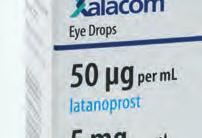

















Xalatan and Xalacom are now proudly brought to you by Aspen. Made by the original manufacturer. If clinically necessary for the treatment of your patients, consider prescribing by brand.










Before prescribing please review Product Information available via www.aspenpharma.com.au/products or call 1300 659 646.


PBS Information: Xalatan (latanoprost 0.005% eye drops, 2.5 mL) and Xalacom (latanoprost 0.005% + timolol 0.5% eye drops, 2.5 mL) are listed on the PBS as antiglaucoma preparations and miotics.

Minimum Product Information: XALATAN® (Latanoprost 50 µg/mL) Eye Drops. Indication: Reduction of intraocular pressure (IOP) in patients with open-angle glaucoma or ocular hypertension. Contraindications: Hypersensitivity to ingredients. Precautions: Change in eye colour due to increased iris pigmentation, heterochromia; eyelid skin darkening; eyelash and vellus hair changes; aphakia; pseudophakia; macular oedema; other types of glaucoma; contact lenses; severe or brittle asthma; herpetic keratitis; driving or using machines; elderly; children; lactation. Pregnancy: Category (B3) Interactions: other prostaglandins, thiomersal. See PI for details. Adverse Effects: Iris hyperpigmentation; eye irritation (burning, grittiness, itching, stinging and foreign body sensation); eyelash and vellus hair changes (increased length, thickness, pigmentation and number of eyelashes); mild to moderate ocular hyperaemia; punctate keratitis; punctate epithelial erosions; blepharitis; eye pain; excessive tearing; conjunctivitis; blurred vision; eyelid oedema, localised skin reaction on eyelids; myalgia, arthralgia; dizziness; headache; skin rash; eczema; bronchitis; upper respiratory tract infection; abnormal liver function. Uncommon: Iritis, uveitis; keratitis; macular oedema; photophobia; chest pain; asthma; dyspnoea. Rare: periorbital and lid changes resulting in deepening of the eyelid sulcus; corneal calcification. See PI for details and other AEs. Dosage and Administration: One eye drop in the affected eye(s) once daily. Other eye drops should be administered at least 5 minutes apart. (Based on PI dated 09 December 2019)
References: 1. IQVIA Dec 2020
Prepared: February 2021 AF05537 ASP2433 Include brand name on scriptBrand substitution not permitted












Minimum Product Information: XALACOM® (latanoprost 50 µg/mL and timolol 5 mg/mL) Eye Drops. Indication: Reduction of intraocular pressure (IOP) in patients with open-angle glaucoma and ocular hypertension who are insufficiently responsive to other IOP lowering medications. Should not be used to initiate therapy. Contraindications: Reactive airway disease including bronchial asthma (or history), or severe chronic obstructive pulmonary disease (COPD). Sinus bradycardia, sick sinus syndrome, sino-atrial block, second or third degree atrioventricular block, overt cardiac failure, or cardiogenic shock. Hypersensitivity to ingredients. Precautions: Beta-blocker systemic effects: cardiovascular/respiratory reactions; first degree heart block; cardiac failure; severe cardiac disease; severe peripheral circulatory disturbance/disorders; mild/moderate COPD; consider gradual withdrawal prior to major surgery; Beta-blocking ophthalmological preparations may block systemic beta-agonist effects (inform anaesthetist); history of atopy or anaphylactic reaction; caution in hypoglycaemia or diabetic patients, hyperthyroidism, myasthenia gravis; concomitant beta-blocker or prostaglandin not recommended. Ocular Effects: change in eye colour due to increased iris pigmentation; heterochromia; eyelid skin darkening; eyelash and vellus hair changes; aphakia; pseudophakia; macular oedema; other types of glaucoma; herpetic keratitis; filtration procedures; corneal diseases; contact lenses; elderly; children; driving or using machines. See full PI for details Pregnancy: Do not use in pregnancy (Pregnancy Category C) Lactation: Do not use in breast feeding mothers. Interactions: oral calcium channel blockers; catecholamine-depleting drugs or beta-adrenergic blocking agents; antiarrhythmics; digitalis glycosides; parasympathomimetics; narcotics; monoamine oxidase (MAO) inhibitors; CYP2D6 inhibitors; adrenaline; antidiabetic agents; thiomersal. See PI for details. Adverse Effects: For complete list see full PI. Ocular: eye irritation; hyperaemia; abnormal vision; visual field defect; iris hyperpigmentation; eyelash and vellus hair changes; conjunctivitis; blepharitis; corneal disorder; eye pain; keratitis; photophobia; cataract; conjunctival disorder; errors of refraction; macular oedema; corneal calcification; corneal oedema and erosions; blurred vision; dry eyes; periorbital and lid changes resulting in deepening of eyelid sulcus; darkening of skin of eyelids, skin reaction on eyelids; diplopia; ptosis; choroidal detachment (following filtration surgery). Systemic: Serious respiratory and cardiovascular events (e.g. worsening of angina pectoris, atrioventricular block, cardiac failure, cardiac arrest, respiratory failure, pulmonary oedema, asthma); herpetic keratitis; chest pain; anaphylaxis; skin rash; headache; depression; myalgia; arthralgia; dysgeusia; vomiting; abdominal pain; sexual dysfunction. Dosage and Administration: One eye drop in the affected eye(s) once daily. Other eye drops should be administered at least 5 minutes apart. (Based on PI dated 21 February 2020)
Aspen Australia includes Aspen Pharmacare Australia Pty Ltd (ABN 51 096 236 985) and Aspen Pharma Pty Ltd (ABN 88 004 118 594). All sales and marketing requests to: Aspen Pharmacare Pty Ltd, 34-36 Chandos Street, St Leonards NSW 2065. Tel: +61 2 8436 8300 Email: aspen@aspenpharmacare.com.au Web: www.aspenpharma.com.au Trademarks are owned by or licensed to the Aspen group of companies. © 2021 Aspen group of companies or its licensor. All







Ophthalmologist and 2020 Australian of the Year Dr James Muecke has weighed into the debate over a major change to the health star system that will now see fruit juices lose their favourable nutritional rating, with some set to rank below Diet Coke.
Until now 100% fruit juices had a fivestar rating, but last week The Australian and New Zealand Ministerial Forum on Food Regulation voted to rate it according to sugar content, and not allow special treatment.
The decision means some fruit juices with high sugar content will now score as low as 2.5 stars, which is below drinks like Diet Coke (3.5 stars), however juices with less sugar may obtain four stars, according to the Sydney Morning Herald
The decision has been criticised by Australian citrus growers and Federal Agriculture Minister Mr David Littleproud, but Muecke believes that it’s appropriate drinks like orange juice (OJ) are downgraded “from its lofty five-star status on Australia’s Health Star Rating System”.
“An average glass of OJ contains 21 grams of sugar, which is just below the 25g daily intake recommended by WHO for women and kids,” he told Insight

"AT LAST OUR POLITICIANS ARE SHOWING DECISIVE ACTION"
JAMES MUECKE, OPHTHALMOLOGIST
unhealthy products that also receive “an artificial seal of healthy approval on our flawed and voluntary health star rating system”, including many diet soft drinks, and “ultra-processed products” such as Sanitarium’s Up & Go and margarine.
“Hopefully, we’ll see them all lose stars in the near future,” he added.
Muecke’s views were backed by nutritionists who argued fruit juices should be rated according to their high levels of sugar and low levels of fibre, or how a drink compares to a piece of fruit.
“It’s all about raising awareness amongst the public of the dangers of excessive sugar consumption and at last our politicians are showing decisive action. When one third of Aussie kids are overweight or obese, giving them four to five teaspoons of sugar in a glass of OJ for brekkie each morning is just not good enough.”
Since receiving Australia’s top Australia Day honour last year, Muecke has used the platform to draw attention to the link between excessive sugar intake, diabetes and preventable vision loss. He’s also advocated for a sugar tax, better food labelling and restrictions on advertising during children’s TV programs.
Muecke said there were many other
On behalf of Australian citrus fruit growers, Citrus Australia CEO Mr Nathan Hancock said basing the health rating on sugar content alone was “flawed” and did not recognise the health benefits.
“Fruit juice currently contributes $736 million to the Australian economy. We fear any decline in sales under this false premise would also hasten the demise of the Australian orange juice industry,” he said.
“Reduced sales will also lead to significant job losses right across the supply chain, including juice factories and transport, and less Australian brands. It’s a high price to pay for a flawed concept focussed solely on sugar at the expense of nutritious elements like Vitamin C, Folate and Thiamin.” n
Australian optometrists, ophthalmologists and their staff will receive a COVID-19 vaccine in the second wave of a fivephase national rollout strategy, according to the latest information from the Federal Government.
The groups are categorised as Phase 1a, 1b, 2a, 2b and 3 in order of priority.
Phase 1a is made up of 678,000 people, including quarantine and border workers, frontline health workers, and aged care and disability staff and residents. All are expected to get their first jab by late February.
Phase 1b is expected to cover 6.1 million people including anyone over 70 years old, and up to 953,000
other healthcare workers – including optometrists and ophthalmologists. Younger adults with an underlying condition and high-risk workers like emergency services personnel and meat processing workers are included in this group. It also includes Aboriginal and Torres Strait Islander people who are over 55.
The Federal Government hasn’t provided estimated timeframes for when this group will be offered a vaccine but the ABC predicts it is likely to be sometime between late March and early April 2021.
Phase 2a covers Aboriginal and Torres Strait Islander people who are between 18-54, along with Australians over 50 years old and other critical high-risk

Phase 1b will cover 6.1 million people.
workers. Phase 2b is the rest of the adult population, plus anyone from the previous phases that have missed out.
Phase 3, the final phase, will be for children but only “if recommended” given the evidence that they don’t transmit the disease like adults.
Chief Medical Officer Mr Paul Kelly has previously said most Australians will get the Oxford-AstraZeneca vaccine, which received Therapeutic Goods Administration approval in February. Those people in the highest priority groups are more likely to receive the Pfizer vaccine, which has already been provisionally approved for people over the age of 16. n
The optometric profession has lost one of its giants with the passing of Emeritus Professor Barry Cole.
Respected as the father of modern optometry in Australia, Cole – who passed away in Melbourne on 27 January – had a career spanning six decades that involved major contributions to teaching, research and optometric care.
He qualified in optometry at the Australian (formerly Victorian) College of Optometry (ACO) in 1954 and was appointed its first fulltime lecturer in 1958. He was made the head of the Department of Optometry and Vision Sciences in the University of Melbourne when it was established in 1973 and was appointed the foundation professor of optometry in the university in 1978.

Cole who advocated to have optometry recognised as a degree course at the University of Melbourne and was integral in establishing a national college – the ACO –where he was director for 34 years.
OA said he also helped establish the
Australia (AO) in recognition of service to medicine, particularly in optometry.
OA president Mr Darrell Baker said Cole’s widespread influence in teaching, research and academia and his passion for optometry were exceptional.
“He fought to establish university teaching for optometry in Victoria and a national college, and was an integral part of our Clinical and Experimental Optometry journal for decades. It is the end of an era but Professor Cole’s legacy will live forever throughout Australian optometry.”
The ACO paid tribute to Cole in The Age obituaries: “Professor Cole was the driving force in the establishment of the College and for over 50 years he made a significant and enduring contribution to its


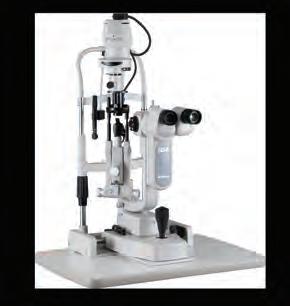
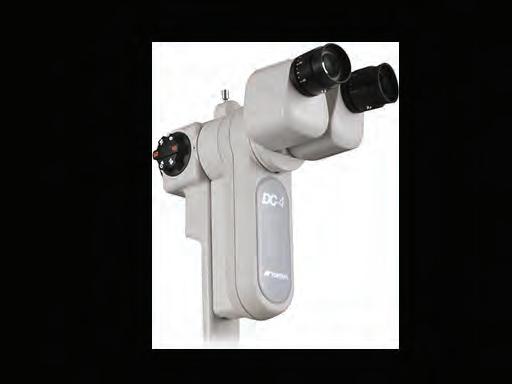

A Queensland ophthalmologist who saved a teen’s sight in one eye after small gauge wire lacerated his retina in a stockyard accident says the case highlights the importance of specialists based in regional areas, particularly during the era of COVID-19.
Dr Andrew McAllister, of Toowoomba Retina & Eye Specialists, treated the 18-year-old from the small town of Dalby, 80km west of Toowoomba, after a thin strand of wire within a bundled cable penetrated his eye through several layers, reaching his retina.
McAllister is the son of a country GP, born in Toowoomba and raised in Murgon, a town 200km north. He completed his subspecialty fellowships in vitreoretinal surgery and medical retina in Hamilton, New Zealand, Townsville and The Royal Victorian Eye and Ear Hospital before establishing the first and only permanent vitreoretinal service west of Brisbane.
He said the teen had been working at a cattle feed lot recently when the accident occurred.
He was eventually rushed into town to see me,” McAllister said. “I saw him two days after the initial injury and his eye was full of pus and there was a very poor

view to the back of the eye.”
When he first presented, his vision was light perception, and the infection was suspected to be gram negative bacilli.
McAllister said it was fortunate the patient had WorkCover insurance and access to a locally based private surgeon. Without public ophthalmology services at Toowoomba Hospital, he would have been required to seek public care more than two hours away in Brisbane, which was going into a hard lockdown due to community spread of the UK variant of COVID-19.
He injected the patient with two rounds of antibiotics – two days apart – and then a day later he went back into theatre for surgery.
"GOING TO BRISBANE WOULD HAVE BEEN MORE PSYCHOLOGICALLY DAMAGING TO HIM"
ANDREW MCALLISTER
“We had to take his lens out because the piece of wire had gone through, and we performed vitrectomy as well,” he said.
“The wire had also lacerated his retina, so I treated that with laser and filled his eye with oil, and so far he is looking much better. I think once we take the oil out in six months his vision should go back to nearly normal. I’m concerned there might be some toxicity from the bacterial infection, but without that timely surgery, he would have definitely been permanently blind in that eye.”
McAllister expects this to improve dramatically once the oil is removed and the retina is stable before eventually inserting a sulcus intraocular lens.
“It’s vital we can provide these sorts of services for patients who either wouldn’t get timely treatment or, given the issues with distance and continued shutdown from COVID-19, can’t get to the city easily, where there’s also the cost of accommodation to consider,” he said.
“So going to Brisbane would have been more psychologically damaging to him, to already have that eye trauma and go that extra distance.” n
New regulations come into force requiring doctors to prescribe PBS drugs by their active ingredient instead of their brand name, in a bid to encourage greater uptake of generic medicines and reduce errors.
Brand names will now largely be excluded from Pharmaceutical Benefits Scheme (PBS) and Repatriation PBS prescriptions as part of the Federal Government’s 2018-2019 Electronic Prescribing Budget initiative that could reportedly save an extra $336 million over the next five years.
The legislation prohibits prescribing software from automatically including brand names on prescriptions, with prescribers only allowed to include the brand name if they deem it clinically necessary. If brand names are included,
the active ingredient must be listed first.
But handwritten scripts or drugs with four or more active ingredients will be exempt.
The aim of the regulation is to improve patient understanding of the medications they take, while increasing the use of generic and biosimilar drugs that will ultimately reduce of out-of-pocket costs for consumers.
In turn, the government hopes this will make the PBS more sustainable, while aligning Australia with international prescribing practices. Health officials also believe the new measure will prevent patients accidentally taking multiple doses of medicines that have different brands, but the same active ingredient.
“Consumers will be better informed about the medicines they are taking,”

the government stated. The Australian Commission on Safety and Quality in Healthcare has listed medicines that doctors should consider prescribing by brand name.
This includes several glaucoma eye drops due to concerns that the active ingredient name is similar to others and will likely cause confusion and selection errors.
The regulation mandates the inclusion of the active ingredients on all PBS and RPBS prescriptions with the exception of: handwritten prescriptions, paper based medication charts in residential aged care settings, medications with four or more active ingredients, vaccines, custom preparations and prescriptions generated through a free text function within prescribing software, and over the counter items. n
A new global myopia survey that involved Australian participants has revealed optometrists are comfortable with fitting children with contact lenses from 9-years-old while for parents the average age is 12.
CooperVision’s recently released Global Myopia Attitudes and Awareness Study also demonstrated that 82% of eyecare professionals worry their young patients will have significant eye health issues associated with myopia in future, yet 54% believe parents don’t understand the risks.
The survey involved 402 eyecare professionals and 1,009 parents with children ages six to 15 across Canada, Spain, the UK, Germany, Hong Kong and Australia and New Zealand.
In other findings, globally parents were more familiar with the term ‘nearsightedness’ than myopia, though the difference varied between
countries. For example, at least eight in 10 parents expressed familiarity with ‘nearsightedness’ across all surveyed countries (82-98%), but only Spain (91%), Hong Kong (86%), and Australia and New Zealand (90%) could say the same for the term myopia.
Once parents had myopia explained to them, 87% were open to learning more about management solutions.
In terms of fitting contact lenses, 84% of eyecare professionals said they would consider them for their paediatric myopes to slow progression. Half of the respondents were comfortable fitting myopic children from the age of 8, with this increasing to three-quarters by age 10. The average starting age eyecare professionals were comfortable with was 9.1 years.
However, 58% of eyecare professionals said parents don’t want to put their children in contact lenses.

And for parents who would consider contact lenses, they preferred their children to start later. Half were were comfortable with their children wearing contact lenses from 11. This increased to three-quarters by age 14. The average starting age parents were comfortable with was 11.7 years old.
According to CooperVision, after learning specifically about its MiSight 1 day myopia control lens, 76% of parents believed it was safe and easy to use for children as young as 8-years-old.
“In these results, we see both opportunity and encouragement for myopia management globally,” Ms Jennifer Lambert, CooperVision’s senior director of global myopia management, said. “A top priority for us and many of our partners is to strengthen myopia awareness among parents worldwide. This is an important step toward our vision for myopia management as a standard of care. n




Researchers from the Centre for Eye Research Australia and University of Melbourne have developed a world-first survey to gather the views of Australians with inherited retinal diseases (IRDs) on potential gene therapies.
The study, led by CERA Honorary Researcher Associate Professor Heather Mack, aims to help eye doctors and researchers understand the support and information patients will need to navigate the complex and rapidly evolving field of gene therapy treatments.
Parents and guardians of children with inherited retinal diseases are also being encouraged to take part in the study.
“As recently as five years ago, someone diagnosed with an inherited retinal disease would have been told that progressive, irreversible vision loss was inevitable,’’ Mack said.
“But rapid advances in gene therapy are creating exciting possibilities that there will be treatments that will slow down vision loss, or possibly even restore lost sight.’’
The most notable of these has been Luxturna, which Australia’s Therapeutics Goods Administration approved last August. The treatment, which targets the rare RPE65 gene mutation, is the

subject of an application to the Medicare Services Advisory Committee and is expected to be available to Australians within months.
IRDs are thought to affect more than 16,500 Australians, with defects in more than 300 genes known to be associated.
As research in Australia and around the world progresses, it’s anticipated treatments for many forms of IRDs will be developed and become available soon. There are more than 20 international clinical trials of IRD gene therapy under way.
Mack’s online survey will be accessible on the CERA website, with hard copy versions available. It is also possible for participants to dictate their answers to a researcher over the phone. According to CERA, the survey will gauge respondents’ understanding of the potential of gene
"FIVE YEARS AGO, SOMEONE DIAGNOSED WITH AN IRD WOULD HAVE BEEN TOLD THAT PROGRESSIVE, IRREVERSIBLE VISION LOSS WAS INEVITABLE"
therapies, seek their views on issues like genetic testing, treatment costs and clinical trial participation. It is believed to be the first time in the world that researchers have sought views from the IRD community on government-approved gene therapy treatments.
“Knowing how well people with IRDs understand the potential of gene therapy, their expectations and the support and information they need is critical to helping them make informed decisions about participating in treatment or research in the future,’’ Mack said.
She said survey results could inform clinician training – ensuring they are providing accurate and up-to-date information to patients – and also be valuable resource for regulatory agencies and others providing information about gene therapy.
The survey launched on 27 January and will be open for three months. Australians diagnosed with an IRD or the parents and guardians of children with an IRD are eligible.
Links will also be distributed by ophthalmologists and organisations including the Australian Inherited Retinal Disease Registry and DNA Bank, Retina Australia, Cure Blindness Australia, Usher Kids Australia and Vision Australia. n
ProVision has created a new resource that provides optometrists with the know-how to launch a new independent practice or lift the performance of an existing business.
The independent network – with more than 450 member practices across Australia – has introduced LaunchPro, which it says is “the complete resource to opening your independent practice with confidence, support and success”.
“We created LaunchPro with the primary purpose of providing everything you need to know to create and launch your independent optometry business, as well as providing established practices
with an invaluable resource to grow the practice across all stages of the business life cycle,” the organisation stated.
Mr Andrew McKinnon, CEO of Optometry NSW/ACT, said he was excited by the resource’s potential.
“LaunchPro tells you in a really digestible form how you go about putting together the elements that give you a really good chance of success when launching a new practice, acquiring an existing practice, or renewing and improving your practice,” he said.
“Any business is at risk of becoming stale over time. The way you keep the

It's also available to existing owners.
excitement in your business, both for you and your patients, is to renew and refresh every so often. LaunchPro takes you through the elements that are critical in allowing you to take a dispassionate look at your practice and see where you could improve it, how you could tweak it, and how you could make it more rewarding for you and your patients.”.
ProVision’s experts have created a 100-point LaunchPro checklist. It details each required action and corresponding lead time that enables optometrists to follow their 18-week prioritised plan that will set them up for success in their independent practice. n
An ongoing clinical study in Sydney has uncovered an alternative topical therapy to treat microbial keratitis in lieu of the antibiotics recommended by Therapeutic Guidelines Australia.
The Bacterial Ocular Surveillance System study (BOSS) found chloramphenicol in combination with ciprofloxacin/ofloxacin or gentamicin appears to be a suitable alternative, allowing eyecare professionals to choose the best antimicrobials for the corneal infection.
The findings come at a time when the World Health Organisation has called antimicrobial resistance (AMR) a global health threat. Resistant organisms can lead to ocular infection that can irreversibly damage eye structures, resulting in vision loss and blindness. However, prompt use of appropriate antimicrobials can preserve vision.
Professor Stephanie Watson, a corneal
specialist and the head of the Corneal Research Group at the University of Sydney’s Save Sight Institute, is leading the BOSS study alongside Professor Monica Lahra from NSW Health Pathology. Their 2017-2018 results have been published in Communicable Diseases Intelligence, a peer-reviewed journal published by the Department of Health.
Previously known as Keratitis
Antimicrobial Resistance Surveillance Program, BOSS examined 374 bacteria isolated from cases of microbial keratitis at Sydney Eye Hospital from 1 January 2017 to 31 December 2018.
AMR profiles were analysed in the context of the current Australian empiric regimens for topical therapy: ciprofloxacin/ofloxacin monotherapy versus combination therapy of cefalotin/ cephazolin plus gentamicin.
At the Sydney Eye Hospital,
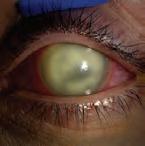
combinations of chloramphenicol plus gentamicin, and chloramphenicol plus ciprofloxacin, are alternatively used, so they were also analysed in the study.
The study found no significant difference between antimicrobial cover provided either with ciprofloxacin/ofloxacin versus cefalotin/ cephazolin plus gentamicin. Though greater toxicity and prolonged healing times have been associated with the latter.
However, importantly, a treatment with chloramphenicol plus ciprofloxacin/ ofloxacin or gentamicin, had significant improved cover.
Dr Maria Cabrera-Aguas, who compiled the report, added: “I'm looking forward to reporting BOSS data for 20192020 in 2021. We will need to watch for any further increases in resistance to cefalotin and whether fluoroquinolone resistance emerges, as has happened in the US and India.” n

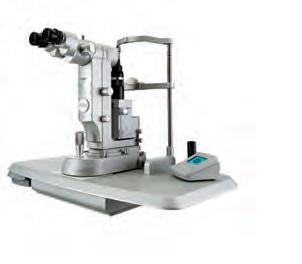
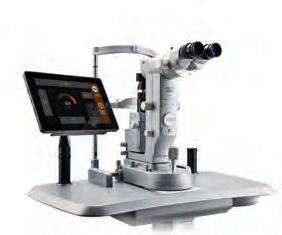







































































































































































Unprecedented clinical interest in measuring axial length has fuelled a new partnership between the world’s largest multi-platform digital suite for myopia management and an optical device company headquartered in Germany.

Myopia Profile, founded in Australia in 2016 by optometrist husband-and-wife team Dr Paul Gifford and Dr Kate Gifford, has joined forces with Oculus, which launched Myopia Master in 2019, to educate eyecare professionals about axial length measurement.
The Myopia Master is based on technology from the Brien Holden Vision Institute and combines autorefraction, axial length and keratometry measurement with risk and output analysis software for clinical management and patient education.
According to both camps, clinical interest and questions on measurement of axial length measurement in myopia management has grown 470% from mid2019 to mid-2020; in the second half of 2020, it grew an additional 35%.
On the Myopia Profile discussion forum on Facebook, posts which feature axial length measurement or interpretation as a key topic have grown from around 5% of posts in 2019 to 10% in 2020.
Despite the explosion in practitioner interest, instrument access and clarity on how to use the data generated from axial length measurements remain key barriers to uptake in clinical practice.
In a 2019 landmark report, the International Myopia Institute (IMI) recognised the necessity of axial length measurement in myopia research, but also the numerous barriers to widespread clinical uptake.
“[The IMI] noted axial length as a desirable but not yet necessary element of clinical myopia management,” Dr Kate Gifford, lead author on the IMI Clinical Management Guidelines report, said.
“The axial length of the myopic eye appears to be more directly linked to the lifelong risk of eye disease and vision impairment due to increasing myopia, and hence should be our key modification goal in clinical myopia management.” n
Device Technologies has introduced a new Topcon binocular refraction system to the Australian market, combining autorefraction, keratometry and subjective refraction in a single device.
The Chronos Automated Binocular Refraction System – launched in Australia and New Zealand on 5 February –occupies less than 1.2 metres of space and features guided refraction software called SightPilot, meaning it can be operated by any practice staff.
According to Topcon Healthcare, refractions take three and a half minutes with the instrument’s binocular testing, allowing eyecare professionals to see more patients without adding exam lanes or trained technicians.
“By allowing standard refractions to be supported by ancillary staff, the optometrist will gain more time to spend with patients on clinical care, eye conditions or complex cases," Device Technologies ophthalmic diagnostic business manager Mr Ryan Heggie said.
“This will also provide patients better access to eyecare by reducing wait times, particularly in regional areas where optometry resources may be limited."
Mr Akifumi Baba, president of Topcon Healthcare Solutions, said the system is controlled from a tablet, laptop or desktop PC, allowing for operation from a safe distance or in another room.

“The one-touch operation and intuitive SightPilot software guides the operator through the entire refraction process with a simple user interface and on-screen prompts, enabling the practice to quickly and confidently complete the subjective refraction,” he said.
Chronos is also said to be simple to adjust and multi-functional for patients who are either seated, standing or in a wheelchair. This enables them to complete the exam without moving to multiple instruments.
“Simply put, Topcon Chronos reinvents refraction,” Mr Chris Mather, Topcon Healthcare Solutions Australia’s director, said.
“This revolutionary all-in-one system saves time and space and allows eyecare providers to delegate the refraction process and grow their practice.” n
EYES RIGHT OPTICAL GIFTS 1500 FRAMES TO TRAINING COLLEGE

Australian supplier Eyes Right Optical has donated 1,500 frames to the Australasian College of Optical Dispensing (ACOD), helping ensure the training provider can run workshops that simulate real world optical practice experience.
The company, operated by siblings Mark and Lisa Wymond who also own Modstyle and Sunglass Collective, donated assorted brands from Eyes Right and Modstyle collections that previously would have had a wholesale value of $100,000.
“James’s passion for dispensing and education is a great asset to Australian optical industry,” Mark Wymond, managing director, said. “A strong
education program helps the whole industry, and we are happy to help.”
ACOD director and senior trainer Mr James Gibbins said it was vital students had access to new frames.
“In our experience in other colleges and schools, we always had limited frames to use and had to re-use them again and again, so they sometimes became quite unstable and fragile," he said.
"Not great for a new student’s confidence if the frame falls apart on them, and it wasn’t their fault because the frame had been heated and manipulated a hundred times before.” n
Funding for OCT machines and the embedding of medical retina and injection clinics in two new locations in the Northern Territory’s Top End has helped turn around poor treatment attendance and compliance among the local Indigenous population.
Previously, patients in the region with diabetic macular oedema (DME) were required to travel long distances to the Royal Darwin Hospital (RDH) that housed the only OCT machine – a vital tool in determining whether patients would benefit from anti-VEGF therapy or to monitor outcomes.
According to Professor Peter McCluskey, director of the University of Sydney’s Save Sight Institute (SSI), 10 to 20 patients per week and their carers were flown to Darwin for assessment from communities hundreds of kilometres away like Gove and Katherine. But the transport and accommodation costs for the care was costing NT Health large
sums of money, and many patients either did not attend or discontinued treatment.
With the support of McCluskey and other visiting consultants from the SSI, Northern Territory-based ophthalmologists Dr Tharmalingam Mahendrarajah and Dr Nishantha Wijesinghe realised that by funding OCT machines in remote communities they could radically improve the situation and save the health system significant expenditure.
Careful negotiation and lobbying with RDH and NT Health lead to the purchase of an OCT machine for Katherine.
McCluskey and his colleague conducted an audit 12 months after the purchase and showed that within six months the OCT scanner had paid for itself from savings in patient travel. It also demonstrated that patient attendance and treatment outcomes improved significantly.
A second OCT was then purchased


for the Gove community. OCTs for other remote communities are now being considered.
Subsequently, McCluskey said monthly medical retina and injection clinics with a consultant and registrar from RDH have been running in Gove and Katherine, with few patients needing to travel to RDH.
“What we did with this project was come up with a collaborative solution for an area of unmet need, that was causing avoidable blindness,” he said. “There is a high prevalence of vision-threatening diabetic retinopathy and a need to take treatment to the community rather than have the patients make frequent trips to Darwin.”
In 2020, McCluskey said the pandemic highlighted the success of the communitybased model of care, with regular visiting registrar clinics able to continue in Gove and Katherine, with back-up telehealth consultant support from Darwin. n


SOLIX
The Fred Hollows Foundation, RANZCO and Australia’s first Aboriginal ophthalmologist
Associate Professor Kris Rallah-Baker have formed an alliance to call for a First Nations Voice to Parliament to be enshrined in the Australian Constitution.

The call supported From the Heart’s Week of Action to promote the Uluru Statement from the Heart and advocate for a constitutionally enshrined Aboriginal and Torres Strait Islander Peoples’ Voice to Parliament.
“As a nation, Australia is far behind other former British colonies in addressing issues that remain as a consequence of the dispossession and occupation of Aboriginal and Torres Strait Islander Peoples, which began on 26 January 1788 and has not yet ended,” RallahBaker said.
The Fred Hollows Foundation CEO Mr Ian Wishart added: “Australia has seen a reckoning with racial injustice and it’s abundantly clear that Aboriginal and Torres Strait Islander Peoples still do not have ‘a fair go’. It’s time First Nations Peoples had their say when the parliament makes laws that affect them.”
The Uluru Statement was delivered in 2017, following an unprecedented National Constitutional Convention held by, with, and for First Nations Peoples. It is said to be an invitation to all Australians to walk with Aboriginal and Torres Strait Islanders and support their calls for constitutional and structural reform.
“Without appropriate address we can never truly decolonise and heal the scars that haunt our collective psyche,” RallahBaker added.
RANZCO president Professor Nitin Verma said the college supported the Uluru Statement from the Heart “as a key step towards reconciliation with Aboriginal and Torres Strait Islander Peoples”.
The Week of Action was the first of many events over the next year to build a movement of the Australian people in support of a referendum on a Voice to Parliament. n
Queensland researchers are harnessing sericin produced by mutant silkworms to investigate the protein’s role as an antioxidant agent against unstable molecules in the eye responsible for diseases like macular degeneration and glaucoma.
Queensland Eye Institute’s chief scientist Professor Traian Chirila, senior research officer Dr Shuko Suzuki and research assistant Dr Onur Sakiragaoglu are among the first team of researchers to assess the biological and clinical responses of various eye cells when exposed to two proteins that make up the silk thread – fibroin and sericin.
They discovered sericin isolated from silk cocoons and added to cells grown in the laboratory may display antioxidative effect. The protein has shown to be more effective for the growth of the corneal and retinal cells.
Much of the research has focused on tackling free radicals, which are unstable molecules that can chemically damage other molecules in the body. Oxidative stress and free radicals have been associated with eye diseases such as age-related macular degeneration (AMD), glaucoma and diabetic retinopathy.
While current treatments are aimed at slowing vision loss, the researchers note there is no therapy to reverse the toxic effects caused by oxidative stress on the retina and photoreceptor cells, and no

treatments can restore their function.
“Retinal cell transplants have thus far proven to be of limited value to patients, as the healthy cells are eventually exposed to the same high levels of oxidative stress once they are transplanted,” they stated.
However, with their research demonstrating the antioxidative effect of sericin, the QEI team can now advance investigations using sericin isolated from silk cocoons to promote the growth of vital eye cells.
The protein is produced by the silkworms of a mutant silkmoth developed by Japanese scientists. The resulting cocoons contain only one protein, sericin, which removes the need for extraction or purification processes.
Their efforts are now focused on further monitoring and assessment of the antioxidative effect of these membranes on the growth of retinal photoreceptor cells. n
TRANSITIONS GIFT CARD GIVE AWAY FOR EYECARE
Transitions Optical is giving away 200 Visa prepaid gift cards to eyecare professionals that register and complete education modules as part of a relaunch of the Transitions Plus portal.
The modules allow eyecare professionals to keep their Transitions knowledge up-to-date to address patient questions and make recommendations with confidence. Modules also go beyond Transitions lenses into consumer insights, buying behaviour and dispensing tips.
Mr Stuart Cannon, Transitions Optical general manager of Asia Pacific, said the content suits a broad audience
of experience and training, with new modules rolling out during the year.
“We see Transitions Plus as part of our ongoing partnership with Australian practices to help them grow their business by providing instant access to a variety of marketing and communication resources,” he said.
Eyecare professionals must complete seven education modules – including the Light Sensitivity module – by 31 May 2021 to be in the running to win one of the Visa prepaid gift cards.
Register at www.transitions-plus.com using registration code InsightEd. n
Medical instrument disinfectant producer Tristel has developed a solution specifically for ophthalmic devices that’s also TGAapproved and in line with the relevant Australian Standard.
The product – Duo OPH – is a chlorine dioxide foam formulation for high-level disinfection of ophthalmic instruments that make direct contact with the eye.
The company’s Australia managing director Mr Ash McMaster said a lack of knowledge and outdated practices often dictate how practices and clinics reprocess devices that touch the eye, including tonometer prisms, diagnostic lenses, pachymeters and A- and B-scan ultrasound probes.
He said the majority use alcohol wipes, dilute hydrogen peroxide or sodium hypochlorite, but they neither meet requirements in Australia for device disinfection, nor demonstrate sufficient
microbiological efficacy. Some may be an infection control risk and have been known to damage equipment.
According to McMaster, Australian Standards state medical devices that touch a mucosal surface – such as the eye – are required to undergo high-level disinfection with a product recognised by the TGA. They are classed as ‘Class IIb Medical Devices’, which Duo OPH falls under, aligning it with AS/NZS-4187.
“The unique foam formulation passes local regulatory requirements as a highlevel disinfectant, with efficacy against required organisms, and is approved by most major device manufacturers,” he said. “Duo OPH has been recognised by international and local peak bodies, including in Optometry Australia’s recent Infection Control Update.”
McMaster said alcohol wipes and dilute hydrogen peroxide were not TGA-approved

for disinfection of medical devices. While sodium hypochlorite has recently been discussed as effective against SARS-CoV-2, this chemistry is not approved for medical devices and is deemed ‘off-label’ use.
Additionally, he said most alcohol-based products claim to be effective against viruses in a five-minute contact time, and in some cases this is achieved with soaking carriers in a test tube. However, this was not reflective of real-world use of alcohol wipes, where residual alcohol evaporates before being effective.
“Medical device disinfectants must be tested under real life scenarios, in worst-case testing on actual devices,” he said. “Chemistries listed on a device’s Instructions For Use have passed material compatibility, not demonstrated efficacy in line with local requirements. Prolonged use of these chemistries can lead to damage to devices, such as scratching or clouding, or fixing of proteins.” n





The term ‘quarantine myopia’ has been coined to describe what appears to be a worsening of the condition in many paediatric patients due to lockdowns across the world. RHIANNON BOWMAN asks whether Australian optometrists and parents should be worried.
Children across the world including Australia were plunged into home learning arrangements in 2020, spending several hours a day in front of computer screens as governments fought to stop the spread of the coronavirus.
It immediately placed pressure on parents who were required to adapt to home-schooling while also performing their own jobs from home, leaving some children a free pass on video games, social media and television.
One survey in the US of more than 3,000 parents found the average time spent online doubled for kids during the crisis. Nearly 50% of survey respondents’ kids were spending more than six hours a day – compared to 8% of kids before the pandemic – on online platforms.
Australian eyecare practitioners also turned to screens, gathering in online forums to share their concerns about the uncharacteristic changes in the progression of myopia in their young school-aged patients. One local practitioner noted that a child’s myopia progression over six months is what she would have normally expected over the course of a year.
Their fears were partially confirmed when the results of a six-year study on the progression of childhood myopia in China shot to prominence in January revealing that myopia prevalence in young school-children rose significantly during the COVID-19 pandemic.
It drew on data from approximately 123,000 Chinese children and found home confinement during the pandemic in 2020 appeared to be associated with a substantial myopic shift – approximately -0.3 diopters – for children aged six to eight years.
The study, published in JAMA Ophthalmology, noted the prevalence of myopia appeared to be approximately three times higher in 2020 than in 2015 to 2019 for children aged six, two times higher for seven-year-olds, and 1.4 times higher for those aged eight.
The study, which made headlines in Australia, sparked the new term ‘quarantine myopia’.
Recently, Professor Mingguang He and Professor Paul Baird, both professors at the University of Melbourne and Centre for Eye Research Australia, were co-authors of a comprehensive global research review of myopia published in Nature Reviews Disease Primers in December 2020, outlining a growing global crisis among young people.
They cite the prevalence of myopia in 12-year-old children shows major differences in some Asian regions, with 53.1% in Hong Kong, compared with 20% in the US, and 11.9% in Australia. In Australia, they claim one in four people (six million) have myopia and this is likely to double by 2050. But could these rates accelerate due to new habits brought about by the pandemic?
A Sydney practitioner with a clinical interest in myopia control has noticed myopia progression accelerating amongst her predominantly Asian patient base.
Independent optometrist and ProVision member, Ms Susan Ang, owns Eyestore with practices in Bankstown and Kiama, south of Wollongong.
“Bankstown is the epicentre of Sydney’s Asian and Vietnamese community, so there’s a pool of myopic people in the community.”
Ang is working towards making her practice an exclusive myopia clinic in 2022 and is an active member of a private forum on Facebook, a companion to the Australian-created myopia control and management website, Myopia Profile.
“There has been discussion on the forum and thoughts shared on how practitioners fared last year in myopia management,” Ang says.
Specifically, forum participants have raised concerns about the rate of diopter change among myopic patients, the rise of the ‘quarantine myopia’ phenomenon, and the unique combination last year of winter, lockdowns, shut playgrounds, and parental anxiety about coronavirus.
Ang established her Bankstown practice in 2002, and says she noticed an increase in myopia when new technology such as iPads became widespread.
“Technology has accelerated myopia,” she says. “Last year NSW had six weeks of school lockdown. In term 3 – July – 50% of students went back to school, while the other 50% kept learning from home because parents were still working from home, on devices up to 10 hours a day, and kids followed suite,” she says.
Ang immediately noticed an acceleration in myopia progression among her existing patients, and she began identifying new cases with kids complaining of blurry vision.
“I saw a child in February [2020] before the practice was closed during lockdown. We re-opened in May and the child came in for their three-month review. The increase in diopters I would normally see over the course of a year, I saw in six months [in that child],” she says.
At Ang’s Bankstown practice, kids that were following a myopia management treatment plan did better during and after lockdown than those opting for single-vision correction or no correction.
“For the patients under my care, those on atropine 0.05% fared the best in combination with orthokeratology, bifocal, or multifocal vision correction. It has fortified my view that some treatment is better than none,” she says.
“Some parents take a ‘wait and see’ approach and see what happens. There’s still a stigma or belief among the Asian population that glasses make
a child’s eyes worse. Technically, there is some truth in that – wearing singlevision lenses can make eyesight worse. To clarify, those under my care with some form of myopia management treatment strategy fared the best, while those without a strategy, accelerated.”
Ang says she prescribes a range of treatment options, including orthokeratology, bifocals, multifocals, and soft multifocal contact lenses such as CooperVision’s MiSight 1day.
“I started prescribing Hoya Vision’s MiyoSmart lenses in December but haven’t seen patients for review yet – that will happen in the next three to six months,” she said in January.

"SOME
PATIENTS' MYOPIA PRESCRIPTION – WHICH HAS BEEN WELL-CONTROLLED FOR A NUMBER OF YEARS –HAS NOW INCREASED FOR THE FIRST TIME"
JENKIN YAU SANCTUARY LAKES EYECARE
Despite a lack of clinical evidence in Australia on par with China’s latest data, Ang says the effects of lockdown on myopia progression among her Bankstown patients is “palpable”.
“Conversely, myopia hasn’t increased in patients at the Eyestore practice in Kiama, where the population is predominantly Caucasian, and the lifestyle is more focused outdoors as it’s near the beach. There are only five myopia cases in the Kiama practice’s database.”
Optometrist Mr Jenkin Yau, practice partner and founder of Sanctuary Lakes Eyecare in Melbourne’s West, says he has seen a spike in myopia progression in some of his young patients.
“Some patients' myopia prescription – which has been well-controlled for a number of years – has now increased for the first time,” Yau, a ProVision member, says.
“It’s [ostensibly] from a combination of more screen time and less outdoor time [in lockdown] than they would normally experience attending school.”
Despite the “unusual year”, Yau says many of his patients’ myopia has remained well-controlled, due in part to the range of treatment options available.
“I’ve prescribed a lot of Hoya’s MiyoSmart spectacle lenses since October [2020], as I’ve found them to be a good option for kids who aren’t ready for contact lenses. I also prescribe CooperVision’s MiSight daily disposable contact lenses, and orthokeratology lenses,” he explains.
Sanctuary Lakes Eyecare has a mix of Caucasian, Asian and Indian patients and Yau has seen some younger kids more often during the pandemic, as well as new patients referred via family and friends of existing patients.
“I’m hopeful we don’t have another outbreak, but nonetheless, our environment is changing normal patterns of behaviour. Parents have been more lenient with computer use over the past 12 months – it’s our role to provide education and advice about screen time and eye health,” Yau says.

AUSSIE QUARANTINE MYOPIA 'ANECDOTAL' AT PRESENT
Dr Kate Gifford is well-known as a thought-leader in myopia management here and abroad, with one of her most notable contributions being the Myopia Profile platform she co-founded with husband Dr Paul Gifford.
Today, it’s an internationally renowned go-to resource on clinical myopia management for eyecare professionals.
Gifford believes it’s too early to say if Australia has a ‘quarantine myopia’ problem, citing opposing observations in China and the US.
She says the Chinese study is a valuable data set but points out there is significant variability in home-based learning between China and Australia, with the former adopting a more structured approach.
And recent information from the US highlights conflicting opinions from clinicians and scientists on whether myopia seems to be better or worse due to home confinement.
In an article titled ‘What Has the Pandemic Done to Our Eyes?’, published in New York Magazine in January, Californian optometrist Dr Thomas Aller said he was concerned about what effect the pandemic would have on his myopic patients.
He suspected his school-age patients would experience “excess myopia progression” due to remote learning and living in a world where going outside is generally discouraged.
He conducted a survey of 65 of his myopia patients, all of whom were children and were being actively treated for myopia. Comparing their progression before and after the pandemic hit, Aller said: “I concluded that either these kids were very well protected during the remote learning and lockdown with their various myopia treatments, or remote learning was somehow less likely to trigger myopia progression than conventional schooling.”
Gifford says Aller’s survey results, which run counter to the Chinese study, could be partly due to less structured home-schooling, or the product of a less built-up Californian environment.
“Aller’s patients may have had more time outdoors versus students in hard lockdown who can’t leave the house, or have no accessible outdoor space, such as a backyard or courtyard," she says.
“Right now, in Australia, ‘quarantine myopia’ is hypothetical or anecdotal, rather than based on systemic observation. In clinical science, there are levels of evidence, like a pyramid: anecdotal or observational evidence is at the bottom, and a randomised, controlled clinical trial is at the top of the

"IS THIS JUMP DUE TO COVID, OR IS THIS AN ACCELERATION OF A TREND WHICH WAS ALREADY OCCURRING?"
pyramid. The virtue of the Chinese study showing myopia progression in lockdown is that it is a large scale, longitudinal data set, whereas Aller’s anecdotal or observational evidence demonstrates he is not seeing myopia progression accelerating."
“Is it too early to say if myopia progression is accelerating as a result of lockdown? There is not a simple answer.”
Gifford says the Chinese study, including data from over 120,000 school students, demonstrates the average refractive error in children aged 6-8 years was similar between 2015 and 2019, but appeared to jump by a mean of -0.30D in 2020.
“In looking at the data, there was a small trend towards more mean myopia with time in these age groups. There’s no doubt that a larger jump in 2020 was evident. The jump is significant, but small and within the range of error of measurement. Nevertheless, is this jump due to COVID, or is this an acceleration of a trend which was already occurring?” she asks.
“The research team in China have been running that same testing every year for six years, so the timing of COVID presented an important datacollection opportunity.”
She believes the Chinese study results provide practitioners with an opportunity to discuss the visual environment with parents and young patients, including good screen habits, visual fatigue, and ultimately build greater awareness.
To assist parent-practitioner discussion, the Giffords created My Kids Vision, a free online tool that helps parents assess and manage myopia risks for their kids. A bi-product of Myopia Profile, it includes “how to” video guides on maintaining a healthy visual environment for children during COVID pandemic restrictions, which eyecare practitioners are freely able to share to their own websites and social media platforms. It also provides information on treating myopia, an area where new products are entering the market in rapid succession.
SPECTACLES TO BECOME NEW STEPPING-STONE
Her husband and research optometrist, Dr Paul Gifford, says the market for treating myopia is on the verge of cracking wide open.
He points to CooperVision’s MiSight daily disposable contact lenses as having shown significant efficacy for managing myopia and been wellaccepted since launching in the Australian market, and now Hoya and Essilor are shaking up the myopia spectacle lens segment.
“Spectacle lenses – such as Hoya’s MiyoSmart and Essilor’s Stellest – with

AND A

"THE INCREASE IN DIOPTERS I WOULD NORMALLY SEE OVER THE COURSE OF A YEAR, I SAW IN SIX MONTHS"
DR PAUL GIFFORD
MYOPIA PROFILE
SUSAN ANG EYESTORE
● Daily disposable soft contact lenses
● Proven to significantly slow the progression of myopia1
● The first and only FDA-approved product to slow myopia progression^





A myopia control spectacle lens that launched in Australia last year is proving popular among a new and unexpected cluster of optometrists.
Hoya introduced MiyoSmart with D.I.M.S. Technology here last October. The non-invasive method was developed on the back of a two-year double-blind randomised clinical trial in Hong Kong that showed wearing defocus spectacle lenses daily significantly slows progression and axial elongation in myopic children aged 8 to 13.

A peer-reviewed study found myopia progression slowed (SER) by 59% and axial elongation decreased by 60% compared with those wearing single vision lenses*.
Mr Ulli Hentschel, national training and development manager at Hoya Lens Australia, says uptake in Australia has been incredible, “especially among optometrists that have not yet begun myopia management services in their practice”.
“This is very exciting because it seems that the introduction of MiyoSmart in the market has been the catalyst of change for many optometrists to start on this journey of myopia management. If we can help grow the number of practices that are treating myopia, we can help more children than ever before from progressing,” he says.
As the latest innovation in myopia management solutions, he says MiyoSmart is fast becoming a preferred first line option for eyecare professionals and their young myopic patients.
“As a spectacle lens that is highly effective, safe, easy to prescribe and use, MiyoSmart is a game-changer in terms of increasing the amount of children that have access to a myopia management option.”
In terms of the variety of children commonly being prescribed MiyoSmart, Hentschel says: “The majority would be young children that have either not had any myopia control treatment yet or less effective spectacle lenses, as well as children that have previously been wearing contact lenses and either didn’t want to continue or wanted an alternate option to contact lenses.”
*Lam CSY, Tang WC, Tse DY, Lee RPK, Chun RKM, Hasegawa K, Qi H, Hatanaka T, To CH. Defocus Incorporated Multiple Segments (DIMS) spectacle lenses slow myopia progression: a 2-year randomised clinical trial. British Journal of Ophthalmology. Published Online First: 29 May 2019. doi: 10.1136/bjophthalmol-2018-313739
efficacy as good as contact lenses is going to revolutionise myopia management,” he says.
In the latest available information, Essilor has claimed after one year children wearing its Stellest lens saved more than half a diopter of myopia degree, on average, corresponding to a more than 60% slowdown in myopia progression compared with a control group wearing single vision lenses. Trials have concluded children wearing Hoya's defocus lens had 60% less myopia progression compared with those wearing single-vision lenses.
Dr Paul Gifford explains: “Especially for very young children, spectacle lens options offer an opportunity for even earlier adoption of effective myopia control strategies, and can even act as a stepping-stone to contact lenses. These new spectacle lenses have the potential to revolutionise spectacle and contact lens sales. At the moment the step is often too high to go straight to contact lenses for effective myopia control, and single-vision lenses are not effective in slowing progression. Hoya and Essilor’s new myopia controlling spectacle lens options bring in an easier step and a lower barrier to jump into myopia management, for both practitioners and parents.”
He continues: “If I had a crystal ball, I would predict that these spectacle lenses will become more and more mainstream and be considered the normal mode of correction for myopes – making it easier for parents to accept and understand the importance of myopia management."
The Giffords agree it will remain anecdotal whether ‘quarantine myopia’ in Australia is fact or fallacy but in China time will tell.
“The gradually increasing prevalence of myopia [in China] might account for the observation in this recent publication. This Chinese study has accumulated large volumes of data, with the same testing repeated annually for six years. Will the same study reveal a similar trajectory next year or was COVID-19 just a blip?,” Paul Gifford says.
LONG-TERM IMPLICATIONS
Professor Padmaja Sankaridurg is head of the myopia program at the Brien Holden Vision Institute (BHVI) and conjoint professor at the School of Optometry and Vision Science at the University of New South Wales.
She has been managing the myopia program since its inception in 2003, and over the years BHVI has seen successful translation of its technology into myopia control products, namely peripheral defocus technology incorporated into MyoVision, and its extended depth of focus (EDOF) technology incorporated into a regulatory-approved myopia control contact lens manufactured by mark’ennovy (Mylo). It also recently penned a deal with Bausch + Lomb to develop a myopia contact lens.
And in 2019, BHVI signed a licensing agreement allowing its algorithms for tracking and estimating refractive error to be incorporated into Oculus’s world-first instrument for myopia management (Myopia Master).
Sankaridurg acknowledges the quarantine measures to manage the COVID outbreak saw schools shut and children confined indoors with their normal activities significantly curtailed.
“The challenge of the extended lockdown stretching into months has seen a shift to increased time spent online on digital devices,” she notes.
“This prompted a concern that the increased time spent indoors and on digital devices may have resulted in an increased progression of myopia or a myopic shift in refractive error.”
Sankaridurg points to the Chinese study which found an increased prevalence of myopia in children aged six to eight years in the year 2020 compared to previous years.
“As this study indicated, it appears that younger children, six
to eight years of age who are in the critical stages of eye growth and development may be more prone to such environmental influences,” she says.
Sankaridurg says the potential long-term implications of accelerated myopia progression could be catastrophic for young patients.

" HAVING MULTIPLE OPTIONS IS DESIRABLE; THEY BALANCE
THE INDIVIDUAL’S CIRCUMSTANCE AND THE DESIRED OUTCOME FOR MYOPIA CONTROL"
PROF PADMAJA SANKARIDURG, BHVI
“Increased and accelerated progression of myopia results in the eye reaching higher levels of myopia; -5.0D and above. This is particularly important if the myopia is observed in young children; the rate of progression of myopia is faster in younger children and since they are likely to spend a greater number of years in the progression phase, they are likely to reach higher levels of myopia. High myopia is significantly associated with a risk of complications particularly in adult life. Such complications may be associated with loss of vision and may be
progressive, such as myopic maculopathy, for example,” she says.
Fortunately, Sankaridurg notes there is clear evidence that both the onset as well as progression of myopia can be better controlled with many optical, pharmaceutical and environmental strategies.
“Many of these strategies have been adopted by practitioners as off-label treatments – for example, use of multifocal soft contact lenses for myopia control – but more recently there have been products that have been specifically designed and available for myopia control. The uptake of such treatments has been steadily improving,” she says.
While having multiple treatment options is beneficial, Sankaridurg cautions that patient management is multidimensional.
“In addition to efficacy of a given product, many patient related factors such as age, motivation, lifestyle, product related factors such as affordability, availability as well as cultural factors and expertise of practitioners, influences the choice of a treatment strategy,” she says.
“For example, in young children with myopia, spectacles may be considered to be more convenient than contact lenses whereas in older children, contact lens may provide other benefits. Thus, having multiple options is desirable; they balance the individual’s circumstance and the desired outcome for myopia control.”
Sankaridurg’s colleagues Dr Kathleen Watt and Dr Pauline Kang, coheads of the Myopia Clinic at UNSW’s Optometry Clinic, have recently collated myopia progression data of children who attend their clinic, to evaluate if there was any impact of COVID lockdown on their myopia progression.
Results aren’t yet available, but it could provide the first true insight into whether Australia has avoided or succumbed to ‘quarantine myopia’. n

Commonly used products, such as alcohol, are not recognised as medical device disinfectants in Australia. They are no longer recommended in many international guidelines due to the risk of damage to devices, their inability to inactivate many infectious organisms, and the link to Epidemic Keratoconjunctivitis (EKC) outbreaks.
Tristel Duo OPH has been specifically designed for the high-level disinfection of medical devices used in eyecare, and is listed in the latest, local, evidence-based disinfection guidelines. Tristel Duo OPH passes local regulatory requirements and is effective in two minutes against organisms of concern in optometry and ophthalmology.
The first implantation of a Johnson & Johnson Vision’s latest monofocal intraocular lens (IOL) in the US has taken place in Texas the same month it was given Food and Drug Administration (FDA) approval.
The company announced inFebruary that the regulator approved the TECNIS Eyhance and TECNIS Eyhance Toric II IOL for the treatment of cataract patients in the US. The monofocal version of the lens has been available to Australian eye surgeons since mid-2019.

“With this approval and subsequent commercial launch, ophthalmologists in the US now have the ability to choose this next generation monofocal as the lens of choice for their patients with or without astigmatism,” the company stated.
The lens was first launched in Europe in February 2019 and became commercially available in Latin America and Canada in 2020. Both monofocal and toric forms of the lens are now commercially available in the US, with toric launching in Europe and Canada later this year.
According to the company, the lens features a refractive surface designed to slightly extend the depth of focus through the unique shape of the lens.
Johnson & Johnson Vision said its latest addition in the TECNIS family of IOLs was designed to deliver better image contrast in low light and provide safe and easy delivery using the new TECNIS Simplicity delivery system.
Chief medical officer and global head of clinical and medical affairs at Johnson & Johnson Vision, Dr Rajesh Rajpal, said TECNIS Eyhance combines low-light performance with refractive surface design, providing a new kind of monofocal experience for cataract patients.
“Additionally, the TECNIS Eyhance Toric II lens is engineered with a new squared and frosted haptic design for added friction inside the capsular bag to treat cataract patients with astigmatism,” he said. n
"OUR
DIVERSIFIED PORTFOLIO HAS ONCE AGAIN PROVEN TO BE ROBUST"
LUDWIN MONZ, ZEISS MEDITECH
Carl Zeiss Meditec has rebounded to the company’s pre-pandemic revenue, generating €368.9 million (AU$573 m) in the first quarter of fiscal year 2020/21, down 0.2% on the same period last fiscal year.
Earnings before interest and tax (EBIT) increased to €73.4 m (AU$114 m) versus €56.8 m (AU$88 m) in the prior year.
Carl Zeiss Meditec president and CEO Dr Ludwin Monz said it was a good start to the new fiscal year, particularly in light of the pandemic, which is still ongoing in many markets.
“Our diversified portfolio has once again proven to be robust. I am particularly pleased with the strong contributions to growth from the Asia Pacific region and the good cost discipline within the company, which played a major role in the development of earnings,” Monz said.
Revenue in the APAC region increased for the first time since the start of the crisis, amounting to €158.2m (AU$242.2 m) compared with €150 m (AU$230 m) in the same period of the prior year (+5.5%; adjusted for currency effects: +6.6%). Once again, the strongest contributions to growth were generated in China and South Korea. There was only a slight decline in revenue in Japan.
Revenue in the company’s ophthalmic devices strategic business unit totalled


€283.4 m (AU$440 m) in the first quarter, versus €269.4 m (AU$418 m) the prior year, a 5.2% increase or 8.2% when adjusted for currency effects.
On a currency-adjusted basis, orders received in the microsurgery strategic business unit were already back to the prior year’s level, the company said.
Revenue in Germany, France and Southern Europe was stable while revenue in the Asia Pacific region increased again for the first time since the start of the pandemic, up 5.5% compared with the same period of the prior year n
The inventor of the Essilor’s pioneering Varilux progressive lens has died in Paris at the age of 94.
Mr Bernard Maitenaz, a qualified engineer, was also one of the founders of Essilor Group.
EssilorLuxottica praised Maitenaz’s work that’s helped revolutionise the eyecare sector and millions of presbyopes. To date, more than 700 million Varilux lenses have been sold since 1959, the company said.
Frustrated with his father’s bifocals, and determined to improve his father’s life by improving his sight, Maitenaz was 33-years-old when he took on the task of creating the lens.
“His passion for optics, unwavering faith in its future and valuable contributions have made him one of the most iconic figures in the optical industry,” EssilorLuxottica stated.
Maitenaz was one of the founders of Essilor Group in 1972. At the helm of the company between 1981 and 1991, he oversaw a period of major international growth, which turned Essilor into the world’s leading lens manufacturer. Today, Essilor’s Varilux range of lenses, spearheaded by the Varilux X Series, encompass more than 50 patents, with each individual lens incorporating up to 30 patents alone. n
Ophthalmologists in Florida are vehemently opposing “dangerous legislation” that would allow optometrists to perform certain types of eye surgery and prescribe medications.
According to reports, current Florida law states optometrists are licensed to prescribe corrective lenses and have limited prescription powers, which mostly involve topical medications.
Under the proposed legislation – a pair of bills filed in the Florida Senate earlier this year – the state Board of Optometry would determine parameters for optometrists to become licensed to conduct surgeries.
If passed, optometrists would be allowed to perform eyelid and tear duct surgery, as well as a host of procedures that require incisions. The bills also propose allowing optometrists to prescribe more medication, including opioids.
According to Florida Politics,
proponents have argued that expanding optometrists’ scope-of-practice would give people better access to eyecare. But ophthalmologists argue optometrists do not have the education and training to perform surgery or prescribe certain controlled substances.
The Florida Society of Ophthalmology released a statement in opposition to the bills, claiming it would “drastically expand the scope of optometric practice in Florida and threaten patient safety” if certified.
Dr Sarah Wellik, president of the association, described the legislation as dangerous and harmful.
“This legislation is a misguided attempt that would grant broad and unprecedented surgical privileges to optometrists, who have not completed medical school and are not medical doctors. Ophthalmologists, on the other hand, are medical doctors who spend over a decade receiving extensive

clinical education and surgical training,” Wellik said.
“The idea that an optometrist could become licensed to perform surgery through legislation, instead of completing medical school and residency training, is a dangerous threat to patient safety. With Florida being the epicentre of the opioid epidemic, it would be catastrophic for the Legislature to expand optometry’s prescribing authority to over 4,000 non-medical professionals,” she said.
The two eyecare professions have battled over scope-of-practice for many years.
In 2013, optometrists successfully lobbied for legislation that allowed them to prescribe a limited number of oral medications. It also stipulated optometrists must complete 20 hours of added training, pass an examination, and carry medical malpractice coverage at the same level as medical doctors. n

Seventy-five percent of ophthalmic interventions investigated in a major study have shown evidence of improving quality of life for patients with eye disease, with cataract surgery and antiVEGF therapy singled out as some of the most important procedures.
The recent cross-sectional study of systematic reviews published in JAMA Ophthalmology is thought to be the first global synthesis of the evidence about quality of life (QOL) and eye health and even highlighted certain interventions – such as supplements for macular disease – that didn’t positively impact people’s lives.
During the past decade, QOL measures have gained popularity in ophthalmology research, aligning with a greater recognition of wellbeing and visual function when determining patient outcomes.
The study found there was a “consistent association between vision impairment, eye diseases, and reduced quality of life”. Overall, 33 interventions were investigated, of which 25 were found to improve QOL compared with baseline measurements or a group receiving no intervention.
“Projections from 2015 suggested that in 2020, 127.7 million people will have moderate or severe vision impairment

It's thought to be the first global synthesis of evidence about QOL and eye health.
because of uncorrected refractive error, 57.1 million because of cataract, 8.8 million because of AMD, and 3.2 million because of diabetic retinopathy,” the researchers stated.
“Three interventions (cataract surgery, corrective lenses, and anti-VEGF therapy) provide opportunities to improve the quality of life of more than 150 million individuals globally. Other interventions, such as treating rhinoconjunctivitis in children and adults, trichiasis in endemic areas, and uveitis in those with active and inactive disease, and low-vision rehabilitation, also have the potential to improve quality of life.”
However, the researchers noted ophthalmic interventions differed in their association with QOL. For example, treating cataracts immediately after
"THREE INTERVENTIONS PROVIDE OPPORTUNITIES TO IMPROVE THE QUALITY OF LIFE OF MORE THAN 150 MILLION INDIVIDUALS GLOBALLY"
STUDY AUTHORS
diagnosis – even in those with competing conditions such as AMD and who had already received a first cataract surgery –improved quality of life.
The study also found 11 ophthalmic interventions were not associated with improved QOL.
Among them were radiotherapy and supplementation with lutein and zeaxanthin for AMD, supplementation with nutrients for hereditary retinal dystrophies, early open-angle glaucoma treatment with laser trabeculoplasty and topical beta-blockers, and open-angle glaucoma treatment with selective laser trabeculoplasty and/or medications.
The authors noted that while the significant associations between QOL and ophthalmic procedures were expected overall, previous literature suggests even more eye diseases are associated with worse quality of life, with dry eye being a notable example. However, it was excluded from the study because of a lack of appropriate criteria for critical appraisal.
“Scaling up interventions, such as cataract surgery, refractive error correction, and anti-VEGF therapy at a global level, has the potential to improve the quality of life of millions of people worldwide,” they concluded. n
Two scientists in the UK have shown that a novel low molecular weight dextransulphate known as ILB could play a key role in treating open angle glaucoma.
Excessive matrix deposition (fibrosis) within the eye’s main fluid drainage site can lead to increased intraocular pressure (IOP), resulting in damage to the optic nerve. The researchers report existing therapies mainly work by reducing fluid production in the eye, not the underlying causes, and even newer therapies have shown limited success in the clinic.
The work out of the University of Birmingham, reported in npj Regenerative Medicine, has shown that ILB can normalise matrix deposition
inside the eye and lower IOP in a preclinical model used to mimic these aspects of human glaucoma, paving the way for new anti-fibrotic therapies to be developed for the disease.
The research was conducted by Dr Lisa Hill, from the university’s Institute of Clinical Sciences, and Dr Hannah Botfield, from the Institute of Inflammation and Ageing.
According to the University of Birmingham, Hill and Botfield found that ILB has multi-modal actions across many genes that resolve inflammatory and fibrotic cellular processes. When they progressed their work into a preclinical experimental model of glaucoma, they found that daily subcutaneous
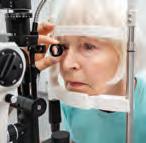
It could reverse the fibrotic process that causes glaucoma.
injections of ILB significantly reduced extracellular matrix levels within the eye’s main drainage site, normalised the eye’s pressure and prevented degeneration of retinal neurons.
“We are truly excited by these results, which show a way forward for a glaucoma treatment that can reverse the fibrotic process that causes the disease,” Hill and Botfield said.
Hill said clinicians working in ophthalmology generally prefer local over systemically delivered therapeutics, as it is a safer route of administration that is more acceptable to patients. She is leading a project to formulate a topical alternative that will avoid the need for injection. n
A grant from CooperVision has supported a team of researchers from the Terasaki Institute for Biomedical Innovation in Los Angeles to develop a contact lens prototype that's shown signs of preventing dry eye.
The lens is composed of a specially engineered hydrogel. The research team began by optimising components of the hydrogel to obtain elastic characteristics that would allow it to be engineered into various shapes with a smooth surface profile.
They then modelled the microchannels in the hydrogel with the use of a 3D printed mould. The final step in the manufacturing process was to enclose the hydrogel channels by bonding an additional layer of hydrogel to the surface of the microchannel.
Once the successful prototype was completed, it was tested for its performance in channelling and collecting fluids such as artificial tears.

“A noteworthy observation during these tests was that when the hydrogel was mildly dehydrated, liquid flow in the channels would stop, but when additional rhythmic pressure was applied, the flow would resume,” the researchers said.
“This was an important demonstration of support for the hypothesis that eye blinking would also provide the necessary pressure and additional hydration needed to allow for tear flow in the contact lens, and therefore, in the eye.”
According to the Terasaki Institute, measurable biomarkers found in tears include sodium ions, which are useful indicators of dry eye disease, and glucose molecules, an early diagnostic tool for diabetes. Measuring the pH of tears can also be used to check for cell viability, drug effectiveness and for signs of disease.
“In addition to our successful fabrication of microchannels in commercial contact

lens hydrogels, we also found that eye-blinking pressure may facilitate tear exchange in the lens through these microchannels,” Dr Shiming Zhang, from the Terasaki Institute’s research team said.
“This is an exciting finding because it opens the possibility for the lenses to be a means of preventing dry eye disease, a condition commonly found in contact lens wearers. We aim to develop a patented contact lens that actively treats this condition by enhancing tear flow in the eye.”
The research team is planning to experiment with smaller channels in thinner hydrogel films before a final contact lens is devised.
Director and CEO of the Terasaki Institute, Dr Ali Khademhosseini, said the successful prototype and the continuing efforts to perfect its capabilities mark a significant advance in contact lens biosensing. n



Differentiation and educating patients on varying lens qualities is one of independent optometry’s greatest challenges today. But an increasing number of practices are finding success with a high-precision eye measurement device that’s also raising sales by up to a third.
Masons Eyecare owner and optical dispenser Mr Eddie Moore is the first to admit it takes a lot to convince him that the return on investment and clinical benefits will be worthwhile before purchasing a big-ticket item.
So when an optometrist told him that Rodenstock’s latest instrument for high-precision 3D eye measurement had led to a staggering 30% jump in spectacle lens sales, he was sceptical. But after much consultation and buyin from his staff he invested in the technology and quickly realised that was no exaggeration.
“After our DNEye Scanner installation in September 2019, our average price for a pair of lenses has risen 25% compared with the previous year, and our actual lens sales overall have risen 34%, so that’s more pairs of lenses,” he says.
“The return on investment has been beyond the pale and telling people our figures today, they still don’t believe me.”
Rodenstock’s DNEye technology has been available to Australian optometrists since 2018 when the company’s second generation DNEye Scanner 2 was introduced here.
The patented technology measures the individual anatomy of each eye with more than 7,000 measurement points that are then used in the lab to produce customised lenses according to the biometric parameters.
The company says it allows full exploitation of the patient’s visual potential, resulting in sharper vision, improved contrasts, better night vision and greater fields of vision. The technology is also the first step in dispensing of Rodenstock’s B.I.G. (Biometric Intelligent Glasses) Vision premium progressives.
Masons Eyecare is among 21 local independent practices who, according to Rodenstock Australia general manager Mr Tim McCann, have adopted DNEye to create genuine value for the patient and differentiate their practice from surrounding competition.
“We’ve found the practices with DNEye are looking to give a tangible reference to the quality and service they have built their business and reputation on. They are typically central to their community and investing for the long term,” he says.
Since acquiring the Kempsey-based practice in New South Wales 16 years ago, Moore and his optometrist business partners Mr Ben Baily and

Ms Naomi Keast had enjoyed 10% to 15% year-on-year growth, but that stagnated two years ago.
While they had always dispensed Rodenstock lenses, the slowdown prompted them to shift their focus to provide only the best quality lenses and coatings. They became unapologetic about what they were offering which alone led to a 15% sales increase.
This provided an ideal platform to then embed the DNEye Scanner, allowing them to offer demonstrably better lenses, while generating record profit.
“Most people say their vision is clearer, sharper and has more definition, and mostly people comment on the benefits for night driving,” Moore says. “We had one lady cry, she was a high myope and her vision had improved to such a degree. We have got teenage kids from one family who had fairly ordinary vision and they noticed a significant difference with aberrations.”
While the technology offers tangible visual benefits, Moore has found the process motivates patients to become more invested in their spectacles, increasing the likelihood of them selecting high value lenses.
While there has been a 5% increase in progressive sales volumes, the practice has noticed a marked uptick in single vision lenses. Last year single vision sales rose $50,000, despite selling a similar number of units.
“All of a sudden instead of a $160 pair of stock single vision lenses, you’re selling $350 to $400 sets of lenses. And once that person goes into progressives the jump doesn’t feel untoward when paying an extra $200, so I think that will eventually come back to us as well,” he says.
“We’re fortunate because we have been working with Rodenstock for a long time. People already had their progressive lens technology anyway, so next time they’ll go for the top end lens with DNEye because it’s only $80 more – that’s where a lot of our sales come from.”
The introduction of DNEye also prompted the practice to overhaul its work practices. It’s switched to lens-first dispensing where the patient finishes their consultation with the optometrist and goes straight to the optical dispenser on the DNEye Scanner. It was a model adopted from fellow NSW practice Zacharia Naumann Optometry, which also offers DNEye technology.
“This connects it to the health part of the consultation, so the patient doesn’t feel that you’re selling a retail product then. After that we take them to select the frames, and that has worked well for us,” he explains.
“Patients also like the idea of the German technology and the reputation that comes with that. We’re then able to step them through the process and show them their higher order aberrations, and then present the type of lenses they can get with DNEye.”
Moore believes one of the most important elements is the consulting tool which shows the patient how their vision through DNEye optimised lenses differs from other lenses.
“I can’t imagine being able to sell them without the consulting tool. Because once you have shown the benefits on both the DNEye and then on the consulting tool, the difference is quite marked.”
Consults now take longer on average, but the resultant higher lens sales make it worthwhile. Some practices charge the DNEye scan as a standalone fee, but Moore has built it into the high value lens price. It also requires buyin from dispensing staff who need to be specially trained and convinced of its benefits.
For Masons Eyecare, possessing such technology has been a useful marketing tool to help differentiate the practice. It featured the DNEye in local TV advertising, and it’s spruiked on its website. But word-of-mouth referrals are mainly driving its remarkable sales figures.
'I’M GIVING YOU WHAT I’M WEARING’
RJK Optometry in Coffs Harbour NSW was one of the first practices in Australia to jump on board with DNEye.
In particular, optometrist Dr Michael Jones says B.I.G. Vision premium

progressives – which require DNEye measurements – have had a huge impact on turnover. Overall lens turnover has increased 30% since installing the device.
“Our ability to sell a premium lens is so much easier to justify and the patients get the results and see the reason why they are getting these amazing lenses. I tell them, ‘I am giving you the best, the same as what I am wearing’,” he says.
Jones gives the patient an explanation on the DNEye and its capabilities before discussing the biometrics of their eye and why the technology is so different to everything else.
“Patients really enjoy this information we give them,” he says. “As an independent optometrist differentiating ourselves from the competition is important. We are now differentiated from the competition in Coffs Harbour completely, no one else has anything like it.”
Mr Grant Hannaford, owner of Hannaford Eyewear in Bowral, NSW, has seen several patients – with no prescription change – immediately spot the difference compared with their old spectacles, the only difference being the incorporation of DNEye.
And it’s not just partners marching their spouses in to get their new glasses, he’s seeing neighbours and friends coming in on recommendation and asking for “the new process”.
“People are viewing it as a clinical process. It is not an upsell, it is not a commodity. And when you are a clinical practice I believe it makes you immune to market forces because you are not using price as a way to drive your practice,” Hannaford, who is also the co-founder and director of the Academy of Advanced Ophthalmic Optics, says.
Hannaford Eyewear analysed data from each of the lens ranges and found even if the patient opted not to put the biometry process in their lens they were still engaging at a higher level.
“That says a couple of things. Having DNEye in the practice has given us a tool but also forced us to engage in a better description of what is happening in the lenses for the patient. It is also getting the patient to consider more carefully what the impact of the lenses will be in the overall experience.”
Hannaford says the DNEye and the associated technology are also helping to demonstrate the value of high-quality lenses and dispensing processes, which are often hidden from consumers.
“Even if the patients don’t take on the DNEye they are understanding there is a difference between two items that ostensibly look the same. When they are looking from their side as the wearer, they can see there is a significant change in their experience,” he says.
“Given some of the disrupters that have come into the market in the last 20 years, you look at the marketing that says you are being overcharged for your spectacles, which is patently untrue. This is something that has been investigated time and again, but they use the point that you can’t really tell the difference between the two to break the level of trust with the practitioner. Now we can show them something that is empirical.” n

Latanoprost was a game-changing glaucoma therapy and still remains a go-to treatment for many ophthalmologists more than two decades later. PROFESSOR JOHN GRIGG – an investigator on an important clinical trial for the drug in 1996 – traces its history and explains how it fits into the treatment algorithm today.
Glaucoma eye drop therapies have faced many triumphs and setbacks over the decades, but for pharmaceutical companies the quest for a ‘Holy Grail’ treatment has always boiled down to three factors: universal effectiveness, reduced side effects and compliance.
Intraocular pressure (IOP)-lowering medications can be traced back to the 1870s with a cholinergic agonist derived from the West African calabar bean initially used for miosis in iridectomy cases, then later found to lower IOP and address angle-closure attacks. During the course of the 20th century, however, beta blockers, adrenergics, miotics and systemic carbonic anhydrase inhibitors emerged as the four main families of antiglaucoma drugs.
But as Professor John Grigg – an academic ophthalmologist and specialist within the Sydney Eye Hospital’s glaucoma unit – explains, up until the 1990s ophthalmologists were eager for a breakthrough first line therapy that was as effective as existing products, but required less effort for patients and fewer side effects.
“At that time, timolol was the gold standard and was a twice daily medication, but that was prohibited in people with asthma and respiratory illnesses because it can induce cardiac failure,” Grigg, who is also head of clinical ophthalmology and eye health at the University of Sydney’s Save Sight Institute, explains.
“We also had Betoptic (betaxolol) which is a selective beta-blocker but it wasn’t as effective as timolol. Other than that, there was pilocarpine which needed to be given four times a day, so compliance was difficult, and then there was epinephrine, an adrenalin compound but it caused allergic eye disease – there were a lot of eye drops, but they all had drawbacks.”
That was until a new compound – latanoprost (Xalatan now distributed
by Aspen in Australia) – shot to prominence after its performance in clinical trials in the mid-1990s. After two decades of development, the once-a-day eye drop represented a major leap forward in terms of effectiveness, safety and tolerability.
Latanoprost was the first in a new class of prostaglandin analogs. Grigg says it still remains one of the most-prescribed glaucoma drops among Australian ophthalmologists under the brand name Xalatan, despite the availability of several generics. Other well-known therapies to later join this group were Travatan (travoprost) and Lumigan (bimatoprost), which now provide more alternative treatment options for ophthalmologists.
As one of his first jobs as a young academic in 1996, Grigg was an investigator in a Phase 3 trial under prominent Australian ophthalmologist Clinical Professor Ivan Goldberg comparing latanoprost with timolol. They followed approximately 30 patients at the Sydney Eye Hospital for several years, forming part of a global trial that paved the way for regulatory approval in Australia in 1997.
“Suddenly we had a drug that had less side effects and only needed to be used once a day – it was a breath of fresh air. Patients with latanoprost often had a 25% IOP reduction at first and then this would flatten out to be a 20% reduction over two years, whereas timolol would have about a 10% reduction, it was quite a dramatic difference,” he says.
“Latanoprost’s main side effects were it causes your eye lashes to grow longer and darker, and if you have hazel-coloured eyes it can turn them brown because it increases melanin production. You do get some irritation, there can be some red eye, but it still causes the least amount of side effects compared with other drops.” Grigg says a defining feature of latanoprost at the time was its mechanism of action.
“In glaucoma medications you have drops that inhibit inflow and some that increase outflow. Latanoprost works by increasing outflow through the uveoscleral pathway, so it doesn’t go through the trabecular meshwork, it actually increases space in the ciliary body to drain through that into the suprachoroidal space, so it’s exploiting a mechanism that was used to deal with trauma in the eye as we’ve evolved.”
Another interesting finding from the 1996 study was that patients who had been taking other glaucoma therapies had developed resistance (tachyphylaxis), therefore they weren’t getting any therapeutic benefit.
“That taught me that it’s good to stop the drops to see whether the patient has developed tachyphylaxis, and then start to tailor your eye drops to what the patient responds to,” Grigg says.
Sixteen years later in a 2012 update of latanoprost’s use in glaucoma and ocular hypertension in the journal SpringLink, the authors wrote that latanoprost monotherapy reduced IOP levels by 22% to 39% over one to 12 months’ treatment. It was significantly more effective than timolol twice daily in three of four large randomised, double-blind trials. Latanoprost also demonstrated a stable long-term IOP-lowering effect, with no sign of diminishing effect during prolonged treatment.
Following the success of the clinical trials, latanoprost was commercialised and first approved in Sweden in 1996 and then in Australia in 1997 by Pharmacia & Upjohn. Following the merger of Pharmacia and Pfizer in 2003, Xalatan was approved in the US that year. The brand name Xalatan continues alongside the well-known latanoprost/timolol combination therapy Xalacom.
Combined, the off-patent Xalatan/Xalacom accounted for US$281 million (AU$363 million) in revenue for Pfizer globally in 2019, however 2020 would be the final calendar year in which the company would hold on to the drugs in Australia.
Last September, it was announced Aspen Pharmacare Australia would acquire the branded glaucoma treatments. It stemmed from a merger between Mylan and Pfizer-owned Upjohn who were only allowed to join forces if they divested Xalatan and Xalacom.
The condition was imposed by the Australian Competition and Consumer Commission (ACCC) which had concerns about how the merger could impact competition and therefore pricing for consumers. For medicines based on latanoprost and latanoprost/timolol, it was particularly concerned that remaining competitors would not be a sufficient constraint on the merged entity.
From a clinical perspective, Grigg says Xalatan remains one of the most widely prescribed by Australian eyecare professionals due to its familiarity, while still presenting one of the lowest side effect profiles.
He says other prostaglandin analog Lumigan – slightly more effective but with more side effects – and Travatan, which has similar effectivity

which maybe tolerated by some patients, are also at ophthalmologists’ disposal. And Xalacom – which combines latanoprost/ timolol in a single formulation – is usually used when therapies like Xalatan or Lumigan haven’t reduced IOP enough. With concerns about the impact of topical drugs on the ocular surface, some manufacturers have also diversified to offer preservative-free options.

While glaucoma eye drops have typically been a first line treatment, Grigg says selective laser trabeculoplasty (SLT) – traditionally a second line treatment – has begun to increase into the realm of initial treatment options.
The flashpoint for this was a study out of the Moorfields Eye Hospital in the UK. Published in The Lancet, the researchers found at 36 months, 74% of SLT patients required no drops to maintain their IOP target and were within target IOP at 93% visits compared with 91% in the eye drops group. No glaucoma surgery was required to lower IOP in the SLT group compared to 11 in eye drop group requiring glaucoma surgery in the study timeframe. And from an ophthalmology cost perspective, there was a 97% probability of SLT as first treatment being more cost-effective than eye drops first at a willingness to pay £20,000 (AU$35,700) per qualityadjusted life-year gained.
“There’s been a changing pattern as a result of the Moorfields study where more people are considering SLT as a first line treatment whereas previously it had always been eye drops first then SLT second – and that’s happening in Australia,” Grigg explains.
“Now I think they hold equal place and so that’s where patient factors come into play. People may be hesitant to have surgery in general, and you’re more wary of offering SLT to patients with inflammation. For people with uveitic glaucoma – it’s not an absolute contra-indication – but perhaps SLT’s not the best first line therapy. There’s also angle closure where after laser iridotomy, people still need drops to keep the pressure down; so there are secondary types of glaucoma where SLT isn’t appropriate, and the eye drops still are.”
He continues: “Precision medicine is the key. Until you know that patient you don’t know what their fears or concerns are; whether they’d prefer to put a drop in every night or have laser and not be aware [of their glaucoma]. You can only know as you understand their health needs and issues, and so then you can tailor the treatment to their lifestyle or medical conditions.”
In terms of compliance, Grigg says latanoprost’s once-a-day application overcame major barriers compared with its competitors, and Xalacom’s combined formulation – removing the need for two sets of eye drops –was also a welcome advance.
However, correct drop installation remains as “a never-ending conversation” with many patients who wrongly attempt to blink the drop into their eye or use more than one drop. Dexterity issues for patients with conditions like arthritis also create problems.
Another benefit of the Xalatan/Xalacom therapies, Grigg says, is the XalEase device, which helps patients correctly position the eye drop container over their eye to deliver a single drop of medication.
“It’s a really nice device and you can get it for free from the chemist. It’s made for the Xalatan and Xalacom bottles and really helps with compliance,” he says. n

Trends already shaping modern optometry were set on an even steeper trajectory with the advent of COVID-19. MS HILKE FITZSIMONS explains why Zeiss Vision Care’s future-focused products are well-positioned to support optometry during its next evolution.
When the brightest minds within Zeiss’s research and development unit begin formulating their blueprints for their latest advances in ophthalmic lens and instrument technology, they think in terms of megatrends.
Digitisation, changing demographics, globalisation and greater consumer health awareness are among the key factors underpinning the company’s next-generation products to drive greater value for practices and patients.
Ms Hilke Fitzsimons is the general manager of Carl Zeiss Vision Care’s Australia and New Zealand operations, based in Adelaide. She says innovation is so important to the company that it devotes more than 10% of its annual turnover to research and development. In 2019/20, R&D expenses amounted to around AU$1.3 billion.
“Megatrends is something we have been looking at as a company globally for a number of years now,” Fitzsimons, who has an MBA from University of South Australia and Masters of Engineering from the Technical University of Braunschweig (Germany), says.
“With COVID-19 in 2020, we saw some of these accelerate. Digitisation is one major example, but we’ve also seen people have a greater awareness of health issues and a willingness to invest money to protect it. Demographic changes such as the aging population aren’t accelerating as much but will continue – and with the rise of myopia we’re not sure yet what the long-term effects will be of extended time indoors.”
At the micro level, the pandemic is altering the course of optometry too. Increased screen time is creating unprecedented demands on the vision system. Meanwhile, the definition of exceptional eyecare has extended beyond the typical fundamentals of optical business to now incorporate hygiene and safety protocols.
As optometrists grapple with new pressures, Zeiss Vision Care has been rolling out a series of new products that are poised to address challenges at macro and micro levels in optometry. Among the new arrivals are a lens portfolio for a device-dependent society, contactless consultations, and an anti-fog system and lens wipe solutions. Although this could be seen as fortuitous timing, Fitzsimons says it’s no accident.
“Many of these trends were here before COVID-19 and will be here after. As a pioneer in optics the ongoing development of product is in our DNA. But because we dedicate huge resources towards products that are fundamentally well researched, the challenge for us now is improving products that were already very good to start with," she says.
“We also need to educate people to use these tools we’ve developed – not for the sake of having something new – but for the purpose of helping them protect their eye health, see better and relieve the pressure and strain on eyes today.”
An example of Zeiss’s continual quest for improvement is its SmartLife lens portfolio. Launched last year in response to changing dynamic vision, it aims to support visual-multi-tasking at various distances and directions, as well as frequent gaze changes prompted by an increasing reliance on handheld devices.
Prior to SmartLife, Fitzsimons says Zeiss already enjoyed a less than 1% non-adapt rate for progressive lenses, however it’s reduced that even further with SmartLife.
“We measure non-adapts, returns and customer feedback, and we are confident we’ve got a product that works for the consumer,” she explains.
“The feedback we are getting in Australia and New Zealand has been extraordinary and some people say they feel as though they don’t have a lens on their face at all. When they switch prescription and glasses, they’ve found it very easy to get used to this lens.”
Fitzsimons believes the SmartLife portfolio – available in single vision, digital and progressive – sets a global standard that should be recognised as a single solution for “always-connected adults”. The technology underpinning it includes changed lens periphery for smoother, clearer vision for frequent changes of head and eye posture driven by the way people interact with devices.
Although it wasn’t ideal launching during the national lockdown in April 2020, its arrival was timely with a Zeiss survey demonstrating half of Australians experienced negative impacts to their eyesight due to rapidly changing lifestyles in 2020. Additionally, 30% reported tired eyes at the end of the day.
“This is not a COVID lens, this is a lens for a lifestyle that we live today,” she says.
“We are so reliant on our digital devices for everything we do now; not just smartphones but watches and tablets. Part of the reason why people are reporting eye strain is because they are switching between the near, immediate and distance so often, with 21% of people surveyed having trouble focusing.”
Although originally designed to provide an enhanced patient experience and more efficient consultation process, Zeiss’s Visuconsult 500 has brought an added benefit in the COVID-19 era.
The software’s core features involve capturing data from the practice’s subjective and objective refractive devices before automatically linking them to the specific patient visit, displaying them on a single screen. This removes the need for manually entering measurements from each testing instrument, helping to also eliminate transcription errors.
But in the ‘new normal’ of social distancing, Fitzsimons says consumers have come to expect digitalised, contactless solutions. The software addresses this on all fronts.
“The Visuconsult 500 allows the eyecare professional to create more physical space between them and the patient,” she explains.
“It’s also a more pleasant experience because the patient can view data from the machines on the iPad. Here, you can show them what it means to use inscription technology with the precision of one hundredth of a diopter, and what comes out of a comprehensive eye exam. Rather than spending time operating machines and entering data, it becomes a more personalised experience, because you’ve freed up time to interact with the patients.”
The software also provides interactive experiences with demonstrations showing patients how the spectacles fit on their face and the different effects of the lens options.
A key piece of new Zeiss hardware that integrates with its contactless consultation software is the Visufit1000, released in Australia last year.
The futuristic-looking instrument digitally determines 3D centration data and creates a 180-degree view of the patient’s face and the frames using nine cameras and 45 million points.
According to Fitzsimons, there’s no need to place a jig or calibration clip on the frame and patients don’t need to turn their head into different positions. The data is captured in a single shot, while maintaining distance between the patient and eyecare professional.
“The centration is collected and can be viewed on the Visuconsult 500, which creates an avatar – it’s essentially a digital head that can spin around, and the patient can look at an image of themselves with different frames, how it fits to their head in real time,” she says.

“But more importantly the eyecare professional gets all the important information from the centration whether it be heights, pupillary distance, back vertex distance, and then they can ensure the lenses are tailored to the patient’s face shape, posture and frames style.”
Demand for anti-fog and hygiene lens solutions has also risen in correlation with mask wearing and a general awareness of transmitting viral/bacterial material on to spectacles amid COVID-19.
Fitzsimons says Zeiss moved to address this by launching its AntiFOG Kit – updated from an older product and incorporating newer technology – and pre-moistened Lens Wipes.
A key feature of the antifog kit is its dual cloth and spray, which combine to create a thin hydrophilic film on either side of the lens that can stay fog-free for three days.
“It prevents water droplets on your glasses from accumulating on the lens surface which causes the fogging, and the film then ensures your visual clarity is not impaired,” Fitzsimons says.
With its existing lens wipes, Zeiss adapted the packaging into various sizes to accommodate different patient requirements, and has included two packets with new spectacles holding Zeiss lenses.
“Australian optometrists have found these products combined are a great way for them to connect with their consumers. It takes minimal store space and creates the potential for repeat business. Our sales of these options has risen significantly in the last six months in Australia and worldwide,” Fitzsimons adds.
Looking ahead, Fitzsimons believes modern optometry’s largest challenge is the pursuit of a customer journey that seamlessly connects the clinical and retail elements. Providing exceptional eyecare with a point of difference begins with the testing performed, interaction with patients and the practice’s presentation as a safe and professional environment. She believes Zeiss’s latest innovations are working to bridge this gap.
“It can’t be: ‘Here’s the clinical corner and here’s the retail corner’; you need to connect the two because the patient wants to see how the clinical side transfers to the retail side,” she explains.
“It’s about connectivity, data and professionalism, so the patient can see what options they have. Having qualified staff that perform the centration professionally, give the consumer choice without overburdening them, educating them, and maybe telling stories about the journey they’ve had and the product they’ve selected. I think these are some key successful points in optometry today.” n

Two years since the launch of KeepSight, Insight asks what measurable difference this once-in-a-generation program is making to those living with diabetes.
Two years ago Diabetes Australia CEO Professor Greg Johnson revealed half of the 1.3 million (now 1.7 million) Australians living with diabetes weren’t getting regular eye checks – meaning eye damage was often identified late when treatment was less effective and more costly.
Johnson shared the alarming statistic at the official launch of KeepSight, a program led by Diabetes Australia and Vision 2020 Australia, with the backing of several organisations like Specsavers, Centre for Eye Research Australia (CERA), Oculo, Optometry Australia and RANZCO. Together, they aimed to obliterate that statistic with the implementation of a systematic, wide-scale recall and reminder system for diabetes patients.
KeepSight has been hailed as a “once-in-a generation opportunity” to dramatically increase eye exam rates and reduce diabetes-related vision loss and blindness in Australia. It’s hoped the model can emulate the success of an initiative in the UK where diabetic retinopathy is no longer the leading cause of blindness in the working age population.
Federal Health Minister Greg Hunt officially launched the program to the eyecare sector in October 2018, followed by a public launch in March 2019. The Australian Government provided an initial $1 million grant for year one, matched by a commitment from Specsavers of $1 million a year for five years.
Now, nearly two years since launching and with almost 140,000 registrations, those behind KeepSight are now aiming to integrate it into the practice workflow of more Australian eyecare providers. Soon, they also hope to monitor aspects of diabetes eye health in near-real time, something that hasn’t been achieved in any other country.
Diabetes Australia estimates around 1.7 million Australians are living with diabetes today, and with an additional 280 people developing diabetes every day, this figure is estimated to grow to 2.45 million by 2030.
All Australians with diabetes are at risk of developing diabetic retinopathy (DR) and there are around 100,000 Australians with vision-threatening DR.
CEO Professor Greg Johnson says, concerningly, this number is expected to double by 2030.
“On average one in three people with diabetes will develop some form of diabetic eye disease which equals about 423,000 Australians,” Johnson says.
“Evidence shows that early detection and timely treatment can prevent the majority of diabetes-related vision loss but, until now, the lack of a coordinated and systematic approach means a significant proportion of Australians with diabetes were not having eye examinations when required. This is despite ample existing capacity in optometry, ophthalmology and general medical practices to support early detection and treatment.”
Diabetes Australia points to the significant daily burden on people with the disease as a potential reason for missing regular eye tests. 'Heads up on Diabetes', a campaign launched as part of National Diabetes Week 2020, painted a picture of how every minute of the day, people with diabetes face decisions, thoughts, worries and fears about their condition and the future impact it may have on their health.
“It is estimated that people with diabetes face up to 180 diabetes-related decisions every day. That is more than 65,000 extra decisions a year. Combined with busy personal and professional lives, remembering and scheduling regular eye checks can be overlooked or put ‘down the list’ of priorities,” Johnson says, adding that some aren’t even aware they need to have their eyes checked.
Johnson believes KeepSight has the potential to fundamentally “shift the dial” on diabetes-related blindness in Australia.
“Once we know someone has registered with KeepSight, and is getting regular checks, we can focus our efforts on those people who may be at risk of losing their sight because they’re not getting checked,” he says.
“In only two years, KeepSight has demonstrated that a coordinated and systematic approach to preventative and timely healthcare to improve outcomes for people with diabetes can have a real impact.
“We see KeepSight as having the potential to be the missing link that will keep Australians with diabetes more engaged in their eye health care and dramatically reduce diabetes related vision loss and blindness in Australia.”
In the past 12 months, Johnson says there has been a steady and significant growth in registrations by optometrists as a result of efforts to integrate the KeepSight registration process into practice workflow with major providers.
“Eye sector practice workflow integration is key to our continued success. This work will continue in 2021 and Diabetes Australia is keen to hear from provider groups who are interested in working on integrating the program into their existing patient management systems,” he says.
Vision 2020 Australia and its members advocated for many years for a national diabetes blindness prevention program, knowing much of the vision loss associated with the disease can be prevented with regular
At end of January 2021, 137,149 people with diabetes were enrolled with KeepSight, up from 101,853 in September. It’s estimated 200,000 people will be enrolled by June 2021.
Specsavers recall response rates comparing people with diabetes to patients receiving standard recalls.
eye exams.
CEO Ms Judith Abbott pointed to an international precedent to support Vision 2020’s activism.
“A national program in the UK led to marked reductions in diabetic retinopathy and we wanted Australians living with diabetes to benefit from a similar approach,” she says.
Someone with knowledge of the lauded UK program is Professor Peter Scanlon, clinical director of England’s NHS Diabetic Eye Screening Program.
In September 2019, he visited Australia and met with the government and industry to understand how KeepSight was progressing. He shared insights from the UK’s screening program which has been running across England for 10 years.
“When we commenced our program in the UK, there were many late presentations which were difficult to treat and patients losing vision because of these late presentations. But as a consequence of the program, diabetic retinopathy is no longer the leading cause of blindness in the working age group in the United Kingdom,” he told RANZCO’s Eye 2 Eye publication in 2019.
He believed Australia could learn from the English system.
“What’s required is the sector working together across patient and professional groups, speaking with one voice, and being focussed on achieving the task. This is perfectly feasible within any healthcare system,” Scanlon said.
“It is particularly achievable in Australia where there is a public and private system that has significant investment and so the main barriers are organisational and not financial.”
For the eye health and vision care sector, Abbott says KeepSight complements existing information and reminder systems practitioners provide their patients and, over time, urge the estimated 700,000-plus people with diabetes who don’t receive regular eyecare to do so.
She says Diabetes Australia, CERA and Vision 2020 Australia have worked together on various initiatives over the years to tackle avoidable vision loss, with Professor Johnson and CERA’s deputy director Associate Professor Peter van Wijngaarden long term advocates for tackling diabetes-related vision loss.
“Specsavers has been another important supporter of the program,
contributing funds to match investment by government and making changes across their own practises to embed KeepSight,” she adds.
“It’s a diverse partnership, and KeepSight benefits from the range of perspectives, knowledge and networks that each partner brings to the program. KeepSight is also fortunate to have financial support from Novartis – a Vision 2020 Australia member organisation – and Mylan.”
‘I WAS CONVINCED THIS SHOULD NOT BE HAPPENING’
CERA has been involved in the advocacy for KeepSight from its inception – convinced it could make a real difference to the eye health of people with diabetes and prevent avoidable blindness.
Like Abbott, van Wijngaarden wanted Australia to emulate the success of the UK program.
“In 2013, I returned from a fellowship in England where I saw first-hand how effective the national screening program for diabetic retinopathy had been in preventing avoidable blindness,” he says.
“In my first few clinics back in Melbourne I was surprised to see people presenting for their first eye checks with very late-stage diabetic retinopathy when treatment is more difficult and outcomes can be poorer. I was convinced this should not be happening and that our eye health services could do better for people with diabetes.”
Van Wijngaarden says Diabetes Australia, as the voice of people living with diabetes and as managers of the National Diabetes Services Scheme – a program that provides health advice and services to 1.4 million Australians with diabetes – was the obvious choice as leaders of a national approach to diabetes eye checks.
CERA researchers have been focusing their energies on the design, integration and promotion of KeepSight.
“One of the most important parts of this has been integrating KeepSight registration in the electronic records of eyecare providers, removing barriers to registration. In the coming months our focus will extend to measuring the impact of the program so that we can clearly communicate the value of KeepSight: first and foremost to people with diabetes, but also to eyecare providers and to funders of the program,” van Wijngaarden says.
He says key impact indicators will include the proportion of reminders that result in return visits to eyecare providers; numbers of registrants; and the

"CREATING A SUSTAINABLE MODEL FOR PREVENTING VISION LOSS IN PEOPLE WITH DIABETES COMES FROM INTEGRATING SYSTEMS AND STREAMLINING PROCESSES"
NAOMI BARBER SPECSAVERS

"PEOPLE WITH DIABETES FACE UP TO 180 DIABETES-RELATED DECISIONS EVERY DAY. THAT IS MORE THAN 65,000 EXTRA DECISIONS A YEAR"
PROF GREG JONHSON DIABETES AUSTRALIA
31,948 eye check reminders have been issued through KeepSight. An estimated 70,000 people will have received reminders by June 2021.
impact of health messaging (both targeted, via the NDSS, and mass market messaging) on diabetes eye check activity.
Having established a digital infrastructure to mobilise and to monitor diabetes eye check activity at a national level, he believes they will be well placed to understand the burden of the disease in near-real time.
“In addition, we will have the opportunity to target health messaging to those people who are not having regular diabetes eye checks. This will be a very powerful means of providing targeted support.”
Van Wijngaarden is not exaggerating when he says KeepSight is “an absolutely critical program” for Australians with diabetes, and the nation’s eyecare sector.
“In two years, we have built the digital systems to enable simple registration of people with diabetes and the automated issuing of reminders to registrants. We have developed and refined consumer messaging to engage people in eye checks and we are now poised to measure the impacts of this on adherence to eye checks at scale,” he says.
“As the momentum builds, we will be able to monitor aspects of diabetes eye health in near-real time, something that has not been achieved in any other country. This model of consumer-focussed digital coordination of care has great potential to scale to improve the care of other complications of diabetes and, indeed, of other chronic diseases.”
From the outset, van Wijngaarden says the importance of collaborating with service providers was well understood to ensure any program would work “on the ground”.
“The combined expertise of all the KeepSight partners in advocacy, research and delivering eye health services enabled us to clearly demonstrate the need for KeepSight, the impact it could have and show how it could be delivered successfully,” van Wijngaarden says. “Equally it was clear that transplanting the English NHS diabetic retinopathy screening program to Australia would simply not work given the differences in the two health systems.”

"A PROGRAM IN THE UK LED TO MARKED REDUCTIONS IN [DR] AND WE WANTED AUSTRALIANS LIVING WITH DIABETES TO BENEFIT FROM A SIMILAR APPROACH"
JUDITH ABBOTT VISION 2020 AUSTRALIA

"WE WILL BE ABLE TO MONITOR ASPECTS OF DIABETES EYE HEALTH IN NEAR-REAL TIME, SOMETHING THAT HAS NOT BEEN ACHIEVED IN ANY OTHER COUNTRY"
A/PROF PETER VAN WIJNGAARDEN CERA
Month-to-month KeepSight registrations and re-registrations through Specsavers practices.
v Standard Recall Response %
As the statistics indicate, an increased focus on supporting and increasing access to eyecare for people with diabetes was paramount, prompting Specsavers to step up to the plate.
Professional services manager Ms Naomi Barber says the need for a robust system of communication and collaborative care for timely intervention is supported by Specsavers data which shows that, on average, only 30% of patients with diabetes respond to recall letters and reminders within the recommended timeframe.
“As part of the Specsavers transforming eye health strategy, we are committed to collaborating with industry stakeholders to develop sustainable models for preventative eyecare and – our litmus test – to measurably improve patient health outcomes,” Barber says.
“We were certain that an initiative focusing on a systematic series of timely eye health check reminders would be a key element to helping prevent vision loss and blindness in people with diabetes.”
In addition to providing $1 million a year for five years, Specsavers has also invested in developing and adopting a range of systems and processes across its network of around 350 practices in Australia.
Looking ahead, KeepSight also provides a unique framework so that government and care providers have a single view of the eye health of Australians with diabetes. With 280 Australians developing diabetes daily, and the annual cost of its impact estimated at $14.6 billion, Barber says this data is vital to ensuring trends are monitored and eye healthcare groups and providers can continually improve patient care to ensure enhanced long-term eye health for Australians with the disease.
MEASURING IMPACT
KeepSight data shows up to January 2021, more than 137,000 people with diabetes have been registered for the first time onto the portal over the past two years. In addition, Specsavers data show nearly 20,000 patients with diabetes have already returned for their next diabetes eye check and had their reminder renewed.
“Bearing in mind the effect of COVID-19 in 2020 and the impact of the Victorian lockdown on optometric care, this is a significant number,” Barber says. “With 1.7 million Australians living with diabetes, this represents approximately 8% of those Australians being supported with their ongoing eye healthcare.”
As COVID-19 restrictions eased across Australia last year, in November alone more than 16,000 patients with diabetes received eye checks at Specsavers
3,638 optometrists are KeepSight-registered and 2,857 optometrists have registered people with diabetes since the program began.
and registered with KeepSight, equivalent to almost 1% of all Australians with diabetes.
Barber says the steady increase in patient volume and percentage of registrations is testament to the systematic approach of developing and integrating KeepSight into the practice network’s standard processes.
“This began at the end of 2018, when changes were made to our practice management software that allowed optometrists to more easily track patients with diabetes to provide baseline data. From here, Specsavers integrated Oculo and then the KeepSight portal directly with the patient management system,” Barber explains.
“These investments have been critical in building a strong registration rate on to KeepSight, and the increase in patient registrations over the past two years has shown that creating a sustainable model for preventing vision loss in people with diabetes comes from integrating systems and streamlining processes.”
Upon KeepSight’s launch, Specsavers aimed to register 200,000 patients with diabetes within two years. As the program’s two-year anniversary approaches, it is close to hitting that target, despite disruption to optometric services due to COVID-19 in 2020. Looking ahead, it aims to register between 80-90% of its patients with diabetes by March 2022.
Barber contends one of the key opportunities to raise the number of patients with diabetes having their eyes routinely checked was to increase the recall response rate for recommended appointments.
To that end, Specsavers data has highlighted the comparison between the recall response rate for patients with diabetes versus standard patient recalls.
While patients with diabetes have always responded to recall at a higher rate than standard recall response, Barber says the data demonstrates since the launch of KeepSight, the percentage has further increased. In September 2019, Specsavers data showed 30% of patients with diabetes responded to recall reminders within the recommended timeframe, compared to 17% of patients who received a standard recall.
“In the time KeepSight has been implemented, this has increased to 34% of patients with diabetes responding to our recall reminders,” she says.
Patients with diabetes who did not return following a recall now receive KeepSight reminders and don’t fall through the cracks.
“Our data shows that the number of patients with diabetes seen across the Specsavers practice network has increased, from 5.2% of patients in January 2019 to 6.6% in January 2021,” Barber explains.
“In addition, our optometrists have already seen over 17,000 patients with diabetes registered with KeepSight return for an eye health check in the second half of last year, and we anticipate that trend to continue in the next two to three years in accordance with recall timeframes,” Barber says.
With Specsavers committed to funding the program until 2023, how much progress is made in clawing back the statistic – that half of people living with diabetes do not currently receive regular eye exams – will be keenly anticipated. n

USHERKIDS AUSTRALIA'S NEW WEBINAR SERIES FOCUSES ON THE LATEST RESEARCH AND CLINICAL GUIDELINES. EMILY SHEPARD AND HOLLIE FELLER DISCUSS COLLABORATING WITH ORTHOPTICS AUSTRALIA ON THE PROJECT.

Usher syndrome is an inherited condition characterised by congenital hearing loss or deafness, progressive vision loss due to retinitis pigmentosa (RP), and in some cases vestibular dysfunction.
It is the most common cause of deafblindness, affecting an estimated 400,000 people worldwide. There are three types of Usher syndrome with more than 13 genetic changes or mutations identified with the condition.

UsherKids Australia is a not-forprofit charitable organisation that was established in 2016 as a parent-led support group to enhance the lives of children diagnosed with Usher syndrome and their families in Australia. The organisation’s mission is to ensure children diagnosed with Usher syndrome and their families have access to an informed, committed and caring community of clinicians, service providers, educators, researchers and peer support networks to allow them to thrive in their everyday endeavours.
UsherKids Australia has released a series of webinars focusing on the latest updates on global clinical research efforts into Usher syndrome, clinical guidelines, how to support your student with Usher syndrome in the classroom and more.
The educational webinars are available on the UsherKids Australia website to watch on demand. They include a range of presenters who are Australian and international leaders in support for children with Usher syndrome, making the content a must for families and healthcare professionals caring for children with Usher syndrome in Australia.
UsherKids Australia worked closely with Orthoptics Australia to ensure the webinar content was relevant for the continuing professional development of orthoptists, as they play a vital role in the care and management of children with the condition.
Of particular note is the presentation by Dr Sandra Staffieri, a senior clinical orthoptist at the Royal Children’s Hospital focusing on the assessment of retinitis pigmentosa, eye appointments and

eyecare and the importance of regular monitoring of vision.
Dr Staffieri discusses the role orthoptists play as part of a team assessing visual function, retinal imaging and specialised ocular electrophysiology assessments for patients with Usher syndrome including how clinicians can work with families to provide the best outcomes from eye appointments.
Orthoptists' dynamic and unique skill set enables them to provide patients with information on glasses, visual aids, adaptive technology support services, and organisations that might be suitable to maximise patient’s vision or provide extra help to cope with their condition. It is important individuals undergo regular ophthalmic review to track progression of the disease and facilitate appropriate strategies and supports to be introduced to manage the reducing visual field. Genetic counselling is also recommended for families. UsherKids Australia board member Ms Lisa Kearns, as an orthoptist and associate genetic counsellor, is at the forefront of genetic counselling for inherited retinal diseases and is uniquely placed as having a clear understanding of the assessments required, the impact of inherited disease such as usher syndrome. There is a lot of promising research
into retinal gene therapy and stem cell technology that bring hope to families with Usher syndrome. Orthoptists also play a critical role in education and actively contributing to upcoming research and clinical trials. Clinicians may like to refer families to UsherKids Australia and can contact the team via email info@usherkidsaustralia.com or via our Facebook page. Our website www.usherkidsaustralia.com provides resources and links about Usher syndrome, available services for families and more information on the USHER IN FOCUS Webinar Series. n
ABOUT THE AUTHORS: EMILY SHEPARD is a co-founder and Director of UsherKids Australia committed to making the lives of children with Usher syndrome and their families better by equipping parents with the support and guidance needed when they’re most vulnerable.
HOLLIE FELLER is a co-founder and director of UsherKids Australia. She is a fierce advocate for early diagnosis of Usher syndrome via genetic testing, the education of clinical professionals as well as support for families around the country to share research and information about the current generation of USH kids.
ORTHOPTICS AUSTRALIA strives for excellence in eye health care by promoting and advancing the discipline of orthoptics and by improving eye health care for patients in public hospitals, ophthalmology practices, and the wider community. Visit: orthoptics.org.au
THERE IS AN ELEMENT OF PHYSICS WHEN IT COMES TO MATCHING A FRAME TO THE PATIENT’S HEAD, WITH THE FORCES OF WEIGHT AND FRICTION PLAYING A BIG PART IN OVERALL COMFORT AND FIT, WRITES LEIGH ROBINSON.

The initial fitting and comfort of a pair of spectacle frames is often the lasting impression the patient has of the practice that you represent. If the frame is not chosen with skill and thought, the comfort and appearance will be affected. As well, there is a risk that the optical performance of the lenses will be compromised.
"WE MUST CONSIDER HOW THE FORCES OF WEIGHT AND FRICTION ACT UPON A SPECTACLE FRAME WHEN IT IS BEING WORN"
My friend Murray O’Brien, in his insightful dispensing article in the October issue of Insight, said: “The dispenser must be fully aware of the patient’s prescription before becoming too involved in looking at frames.” He is correct – prescription interpretation is another complete skill-set on its own, not for the faint hearted. A competent dispenser must be able to visualise where the thickness will be on any prescription and select frames accordingly. With higher powered prescriptions, progressive powered lenses and freeform digital lenses in a market where the customer knows very little about their glasses, the dispenser must manage the fitting and adjustment of the frame. They should also assist the customer with the utility of their new spectacles, managing their expectations of their new lenses is essential for encouraging patient loyalty.
The purpose of a spectacle frame is to position spectacle lenses in direct relation to the wearer’s eyes. A spectacle frame is also required to enhance personal looks, to be comfortable and remain so. It should look good, look fashionable and be a good fit. But it must be fit for the intended purpose, and that is, to hold lenses in the correct position in direct relationship to the visual axis of the wearer.
Time taken with correct frame selection and adjustment will be important for the long-term wearing pleasure for the patient and care taken at this time will save time and angst later.
Fitting spectacle frames might seem an easy thing to do. Something that many people and practice owners think requires little or no training. Just put them on the customer, decide

what colour they like and send it to the lab. But there are some elementary understandings derived from physics when it comes to matching a frame to a head. We must consider how the forces of weight and friction act upon a spectacle frame when it is being worn. When considering frame selection, these reaction forces play a big part in comfort and fit.
Most of the weight of the frame and lenses can be considered to act on the bearing surface of the bridge of the nose, so try to have as much of the frame as possible in contact with the face, across the bridge.
It’s at this stage of frame selection that we must get the frame fitting correctly. Once you have looked at the nose, it’s time to assess the temples. The temples should leave the frame front and pass the side of the head and only touch the head after the ear point. Spectacle frames should touch the patient’s face in three places only, at the nose and the two sides of the head, behind the ear. This is known as the fitting triangle. Counteraction forces create forward motion of the frame-front at the bridge –this is counterbalanced by the temples. In effect the frame presses on the head and the head presses back equally.
The counteraction force behind each ear, has a backwards force component which counters the forward components of each temple at the ear, keeping the frame in position. Sufficient pressure is needed to apply slight grip to the side of the head. Too much pressure and it will create sore spots for the wearer. At this point the frame’s temple drop should not touch the back of the ear for the same reasons, aggravation. A spectacle frame should NOT touch the ear at all, it must touch the sides of the head only. Now, the tricky part is that too much pressure on the side of the head (behind the ear remember) will create aggravation on the head but also on the nose.
The force from the head behind the ear, caused by overtight temples can also cause increased pressure on the nose, forcing the frame upwards and forwards. When a patient complains of a sore nose from their spectacles, we must adjust the frame completely. As well as checking the bridge fitting, you must also check the fitting of the temples. n
ABOUT THE AUTHOR: Leigh Robinson is a teacher of Cert IV in Optical dispensing at RMIT University Melbourne. He also works as an optical dispenser at Mentone Optical in Victoria.
WORKPLACE BULLYING IS A WIDESPREAD PROBLEM IN THE MEDICAL PROFESSION AND CAN BE A DIFFICULT PATH TO NAVIGATE FOR ALL INVOLVED. AVANT’S SONYA BLACK EXAMINES HOW TO IDENTIFY IT AND MANAGE COMPLAINTS.

Dr James is an ophthalmologist in a busy city practice. His last patient complained that the orthoptist, Jenny, was rude to her and rough during the examination.
This is the final straw for Dr James. He’s fed up with having to manage complaints about Jenny, so he calls her into his office and says: “I’ve just had another complaint about you. This can’t continue. How many times have I told you to be nice to patients? It isn’t rocket science.”
"ENCOURAGE AND SUPPORT STAFF TO RESOLVE CONFLICT WITH COLLEAGUES AS INFORMALLY AS POSSIBLE BEFORE A SITUATION ESCALATES"
Jenny responds with a shrug of her shoulders and a comment about the patient being “old and cranky”.
Dr James raises his voice and says, “Enough! You cannot keep doing this. If I get one more complaint, I’ll get you fired!”.
Later that day, the practice manager, Savannah, tells Dr James Jenny has made a bullying complaint. Savannah says she will be investigating and would like to speak with Dr James about it later that day.
Bullying is behaviour that is unreasonable, repeated and creates a risk to health and safety. There are many actions that may constitute bullying, including: intimidating, coercing, threatening, humiliating, shouting, victimising, terrorising, singlingout, belittling, harassing, isolating, freezing out, ganging up, ostracising, rumourmongering, disrespecting, being sarcastic, mobbing, mocking, victim-blaming, discriminating, using innuendo, malicious pranks, physical, verbal or emotional abuse, acting in bad faith and participating in a conspiracy to harm.
Good medical practice: a code of conduct for doctors in Australia states there is no place for bullying in the medical profession.
Reasonable management action carried out in a reasonable manner is not bullying. This means that appropriate performance management and disciplinary action are not bullying if these processes are carried out reasonably.
Bullying requires repeated behaviours. While a single incident of inappropriate behaviour may not be bullying, it may still be inappropriate, and an employer should
take some action to respond to it.
So, what legal issues arise from bullying?
A worker who believes they have been bullied can:
• Complain to his or her workplace about the bullying.
• Complain to Ahpra about bullying by a healthcare worker.
• Make a workers’ compensation claim or complaint to the workplace health and safety regulator.
• Seek an order from the Fair Work Commission for the bullying to stop.
• Seek compensation for breach of contract or negligence.
The workplace should investigate all bullying complaints and take appropriate action (which may include dismissal) against the perpetrator.
A workplace must ensure, as far as reasonably practical, the health and safety of all workers by eliminating or minimising risks to health and safety.
In practical terms, this means an employer must:
• Have a policy about bullying in the workplace which extends to contracted doctors.
• Train staff (including contracted doctors) about bullying.
• Manage bullying complaints if they arise.
• Review the bullying policy on a regular basis.
Dr James reflects on his behaviour earlier in the day. He realises he shouldn’t have raised his voice at Jenny but he was frustrated and Jenny wasn’t listening. Dr James has raised concerns with Savannah many times before, but she hasn’t taken any action.
Dr James speaks with Savannah that afternoon. He acknowledges he should not have raised his voice and he should have reported the patient concerns to the practice manager and let her manage it.
He offers to apologise to Jenny.
However, Dr James uses the meeting as an opportunity to explain to the practice manager that he cannot work with Jenny

Bullying is behaviour that is unreasonable, repeated and creates a risk to health and safety.
and asks that Jenny not be involved in the care of his patients moving forward. As practice manager, Savannah explains that will not be immediately possible from a practice perspective but she does commit to commencing a formal performance management process with Jenny. In addition, she says she will implement an interim arrangement to ensure the situation does not escalate.
Tips for practice doctors:
• Don’t raise your voice at a co-worker
• If you do raise your voice or act poorly, apologise as soon as you can if possible – that may prevent a complaint.
• Leave performance management to the practice manger.
Tips for practice managers:
• Implement a bullying policy explaining what bullying is and what staff should do if they witness or experience it.
• Make sure all staff are familiar with the policy.
• Develop a complaints handling process for your practice.
• Be alert to signs of conflict and act early
• Encourage and support staff to resolve conflict with colleagues as informally as possible before a situation escalates. n
ABOUT THE AUTHOR: SONYA BLACK is Avant’s Special Counsel, Employment. With over 20 years’ experience as an employment lawyer, she advises doctors and medical practices across Australia on a broad range of employment issues.
APRIL 2021
BARCELONA SPECS
Barcelona, Spain
10 – 11 April barcelonaspecs.com
NATIONAL ABORIGINAL AND TORRES STRAIT ISLANDER EYE HEALTH CONFERENCE
Australia (virtual) 20 – 22 April mspgh.unimelb.edu.au
MAY 2021
RANZCO WA BRANCH SCIENTIFIC MEETING
Rottnest Island, WA 7 – 8 May ranzcowa.com.au
JUNE 2021
VISION EXPO EAST
New York, USA 2 – 5 June east.visionexpo.com
MIDO EYEWEAR SHOW
Milan, Italy 5 – 7 June mido.com
9TH WORLD GLAUCOMA E-CONGRESS
Japan 30 June – 3 July worldglaucomacongress.org
ASO EXPO 2021
Melbourne, Victoria 4 – 6 June Info@asoeye.org
JULY 2021
APOTS MEETING
Bali, Indonesia 1 – 4 July apots2020.com
apots2020.com AUGUST 2021
OPHTHALMOLOGY UPDATES!
Sydney, Australia 28 – 29 August ophthalmologyupdates.com
5TH ASIA-PACIFIC GLAUCOMA CONGRESS
Kuala Lumpur, Malaysia 13 – 15 August apgc2020.org
To list an event in our calendar email: myles.hume@primecreative.com.au
SEPTEMBER 2021
O=MEGA21
Melbourne, Australia 2 – 4 September omega21.com.au
SILMO PARIS
Paris, France 24 – 27 September en.silmoparis.com
OCTOBER 2021
AUSCRS 2021
Noosa, Australia 20 – 23 October www.auscrs.org.au
Specsavers Graduate Recruitment team are keen to help
Are you a current final year optometry student, graduating in 2021? The Specsavers Graduate Recruitment Team are keen to chat to you. Our store vacancies are rolling in across ANZ, and we have a number of graduate opportunities available across metro and regional areas. With continued growth in providing eyecare to patients across ANZ, now is an exciting time to join a company that is leading and defining the future of the optical profession. At Specsavers you will have access to cutting edge technology and be part of the driving force bringing Optometry into the forefront of the healthcare industry. Contact us on anz.professionaldevelopment@specsavers.com
Full-time Opportunity – Specsavers Mackay, QLD
Specsavers Mackay are seeking an enthusiastic and driven optometrist to join their high performing team! For the right candidate, both full time/part time options and fixed term opportunities will be considered. Offering up to $140,000 plus super, dependent on experience, this role comprises a highly competitive salary package - APHRA registration, CPD and PII provided. Located on the beautiful coastline of North East Queensland, Mackay has something in store for everyone - the natural beauty of beaches and sub-tropical rainforests, while also having the Great Barrier Reef right at your doorstep.
Join the Specsavers Mobile Optometry Team – Queensland & Western Australia
Specsavers is looking for an experienced optometrist to join our mobile optometry team, supporting stores across Queensland. The position offers a desired work/life balance and a generous salary package. Join Specsavers and work with state-of-the-art technology and professionally trained teams.
Optometrist Joint Venture partnership opportunity, Specsavers Parkes, NSW
Specsavers has an exciting opportunity for an experienced optometrist to join as a JVP in our brand-new store coming to Parkes, NSW. Named after the father of Australian federation, Parkes was once best known for its radio telescope that helped broadcast the moon landing. Today, this beautiful heritage town in Country NSW is famous for the hordes of Elvis fans who make an annual pilgrimage to honour the King. With an initial investment of only $1/share, sign-on and relocation bonus and market rate salary, plus share of the store profits this is an opportunity not to be missed.
Optometrist Joint Venture partnership opportunity, Specsavers Port Lincoln, SA
Specsavers has an exciting opportunity for an experienced optometrist to join as a JVP in our brand-new store coming to Port Lincoln, SA. Port Lincoln is a coastal paradise sitting on Boston Bay in SA – Australia’s largest natural harbour. Known as the seafood capital of Australia, Port Lincoln is famous for award winning restaurants, pristine beaches and an array of outdoor activities to suit any lifestyle. With an initial investment of only $1/share, sign-on and relocation bonus and market rate salary and share of the store profits this is an opportunity not to be missed. All Specsavers
In a few short years, Specsavers has achieved market leadership in Australia and New Zealand with more people choosing to have their eyes tested and buy their prescription eyewear from Specsavers than any other optometrist. To learn more about these roles, or to put your hand up for other roles as they emerge, please contact us today:
Joint Venture Partnership (JVP) enquiries: Marie Stewart – Recruitment Consultant marie.stewart@specsavers.com or 0408 084 134
Australia Employment enquiries: Madeleine Curran – Recruitment Consultant madeleine.curran@specsavers.com or 0437 840 749
Locum employment enquiries: Cindy Marshall – Locum Team Leader cindy.marshall@specsavers.com or 0450 609 872
New Zealand employment enquiries: Chris Rickard – Recruitment Consultant chris.rickard@specsavers.com or 02 7579 5499
Graduate employment enquiries: apac.graduateteam@specsavers.com

As a veteran dry eye patient, I have experienced many highs and lows. From feeling temporary relief via expert treatment through to complex psychological trauma from debilitating symptoms. Dry eye is volatile, difficult to live with and hard to understand. Being young initially complicated the situation as the language is trivial thus explaining the issue to friends, family and co-workers is distressing, adding to the ordeal. My particular case has been diagnosed in different ways, but common findings include meibomian gland dysfunction, nocturnal lagophthalmos and incomplete blinking. Due to extreme photophobia and ache, aspects of corneal neuropathic pain have also been hypothesised. I have also been evaluated for demodex blepharitis, ocular rosacea, preservative toxicity and many other pathologies which fluctuate from appointment to appointment. To gauge what’s truly causing a particular sign or symptom is a challenge which makes treatment itself another challenge.
From the outset I received various opinions, attitudes and level of care from practitioners, yet I always felt something was missing, especially after some bad experiences. There were no speciality dry eye clinics per se at the time, and it was not uncommon to be dismissed without concern. Naturally, I found similar stories amongst fellow
patients online, so I decided to create my own website, AusDryEye.com, to raise awareness with the objective of improving the situation for all patients. After several months and eventually years studying dry eye, communicating with scientists and authorities worldwide, I developed a knack for finding new and innovative information to share, which I still continue today. The website has been well-received internationally and the encouragement from the eyecare community has always been supportive and positive.
The website has evolved and now serves many purposes. I consider it a portal for anyone interested in dry eye, not just patients. I write a newsletter, as well as provide information on clinical trials and industry news. In addition, I launched a support group three years ago which now has almost 3000 patients. Co-ordinating this includes answering queries, sharing news and moderating the many discussions occurring. All this experience has in essence led me to become an unofficial ambassador for dry eye, something I am passionate about, as I have represented patients at conferences and travelled to meet experts in the field to gather information. In learning about different approaches and perspectives across continents, I am now able to facilitate productive conversations between practitioners while continuing to share my extensive knowledge as
an informal consultant to anyone who needs it.
As a result, part of my website’s consultative activities further extended into promoting medical research and trying to connect individuals or teams with funding sources, either through attracting venture capital or pharmaceutical collaborations. This is a difficult and time-consuming endeavour, but I believe the opportunity is there for dry eye, it’s just not being heard.
Doctors and researchers themselves do not have time to write to thousands of firms with their presentations for funding if they have an idea that can help with dry eye disease. Hence my role, as a patient-advocate, involves introducing new possibilities for technology transfer and drug development or commercialisation through the right channels in my growing professional network and beyond.
Currently with permission, I am actively participating in the communication of a new therapy being developed in Sydney by Dr Kenneth Ooi and Professor Stephanie Watson, which has significant symptom alleviating capabilities and international market potential. This can be viewed on my website and I welcome any discussions about propelling this which we tenaciously pursue out of compassion for patients and their suffering.
I started my advocacy website almost 10 years ago with a mission that dry eye will be taken more seriously to improve quality of life for those afflicted. It is wonderful to see dramatic improvements since, particularly in Australia where we have excellent practitioners, educators and companies who are willing to invest time, energy and finance into the disease. Without this there would be no advancement. I hope AusDryEye continues to provide a platform that helps reduce the growing burden of dry eye moving forward. n
Name: Zachary de Silva
Qualifications: B.Soc.Sci
Business: AusDryEye
Position: Founder
Years: 9
Location: Melbourne
DOCTORS AND RESEARCHERS THEMSELVES DO NOT HAVE TIME TO WRITE TO THOUSANDS OF FIRMS WITH THEIR PRESENTATIONS FOR FUNDING IF THEY HAVE AN IDEA THAT CAN HELP WITH DRY EYE DISEASE



Depending on the patient’s clinical condition and preferences, ZEISS offers a wide range of toric IOLs; from monofocal toric to EDoF toric to trifocal toric lenses. ZEISS toric IOLs are available in up to +12 dioptre in cylinder and in 0.5 dioptre steps, providing up to 2,000 different IOL combinations.
zeiss.com/IOLs

